2
RESEARCH METHODOLOGY
45
5
MARKET OVERVIEW
Cybersecurity market thrives on SASE and zero-trust adoption amid rising cyber threats and remote work.
66
5.2.1.1
INCREASING FREQUENCY AND SOPHISTICATION OF CYBERATTACKS
5.2.1.2
GROWING BYOD TREND NECESSITATING NETWORK SECURITY MEASURES
5.2.1.3
INCREASED CLOUD ADOPTION AND REMOTE WORK TREND
5.2.2.1
HIGH IMPLEMENTATION COSTS
5.2.2.2
SHORTAGE OF SKILLED CYBERSECURITY PROFESSIONALS
5.2.3.1
SIMPLIFIED MANAGEMENT AND ENHANCED PROTECTION USING SASE FRAMEWORK
5.2.3.2
IMPLEMENTATION OF ZERO-TRUST APPROACH IN NETWORK SECURITY
5.2.4.1
LACK OF AWARENESS AND TRAINING ON NETWORK SECURITY TECHNOLOGIES
5.2.4.2
INTEGRATION COMPLEXITIES
5.3
UNMET NEEDS AND WHITE SPACES
5.4
INTERCONNECTED MARKETS AND CROSS-SECTOR OPPORTUNITIES
5.4.2
HEALTHCARE & LIFE SCIENCES
5.5
STRATEGIC MOVES BY TIER 1/2/3 PLAYERS
5.5.1.1
RISE OF SECURE ACCESS SERVICE EDGE (SASE)
5.5.1.2
ADOPTION OF ZERO TRUST NETWORK PRINCIPLES
5.5.1.3
AI-DRIVEN NETWORK ANALYTICS AND AUTOMATED THREAT RESPONSE
5.5.1.4
CONVERGENCE OF NETWORKING AND SECURITY PLATFORMS
5.5.1.5
PRIVACY-PRESERVING NETWORK INSPECTION AND ENCRYPTED TRAFFIC VISIBILITY
6
INDUSTRY TRENDS
Navigate competitive pressures and leverage cybersecurity trends to drive strategic growth.
77
6.1
PORTER'S FIVE FORCES ANALYSIS
6.1.1
THREAT OF NEW ENTRANTS
6.1.2
THREAT OF SUBSTITUTES
6.1.3
BARGAINING POWER OF SUPPLIERS
6.1.4
BARGAINING POWER OF BUYERS
6.1.5
INTENSITY OF COMPETITIVE RIVALRY
6.2
MACROECONOMIC INDICATORS
6.2.2
GDP TRENDS AND FORECAST
6.2.3
TRENDS IN GLOBAL ICT INDUSTRY
6.2.4
TRENDS IN GLOBAL CYBERSECURITY INDUSTRY
6.3.1
PLANNING AND DESIGNING
6.3.2
NETWORK SECURITY SOLUTION AND SERVICE PROVIDERS
6.3.4
DISTRIBUTION/RESELLERS/VALUE-ADDED RESELLERS
6.5.1
AVERAGE SELLING PRICE, BY SOLUTION, 2025
6.5.2
INDICATIVE PRICING ANALYSIS OF PRODUCTS, BY VENDOR, 2025
6.6.1
IMPORT SCENARIO (HS CODE 8517)
6.6.2
EXPORT SCENARIO (HS CODE 8517)
6.7
KEY CONFERENCES & EVENTS, 2025-2026
6.8
TRENDS/DISRUPTIONS IMPACTING CUSTOMERS’ BUSINESSES
6.9
INVESTMENT AND FUNDING SCENARIO
6.10.1
JUNIPER NETWORKS HELPED BEELINE ENHANCE EFFICIENCY AND CYBERSECURITY
6.10.2
AMANA BANK BUILT A ROBUST AND EASILY MANAGEABLE CYBERSECURITY INFRASTRUCTURE USING SOPHOS’ TECHNOLOGIES
6.10.3
FORCEPOINT HELPED BURGER KING SECURE SCALABLE NETWORK TRANSITION
6.11
IMPACT OF 2025 US TARIFFS—NETWORK SECURITY MARKET
6.11.3
PRICE IMPACT ANALYSIS
6.11.4
IMPACT ON COUNTRIES/REGIONS
6.11.5
IMPACT ON END-USE INDUSTRIES
7
STRATEGIC DISRUPTION THROUGH TECHNOLOGY, PATENTS, DIGITAL, AND AI ADOPTION
Key takeaways succinctly distilled.
104
7.1
KEY EMERGING TECHNOLOGIES
7.1.1
FIREWALLS/NEXT-GENERATION FIREWALLS
7.1.2
INTRUSION DETECTION SYSTEMS/INTRUSION PREVENTION SYSTEMS
7.1.3
VIRTUAL PRIVATE NETWORKS
7.2
COMPLEMENTARY TECHNOLOGIES
7.2.1
SECURITY INFORMATION AND EVENT MANAGEMENT (SIEM)
7.2.2
NETWORK SEGMENTATION
7.2.3
THREAT INTELLIGENCE
7.2.4
SECURE ACCESS SERVICE EDGE
7.2.5
ZERO TRUST NETWORK ACCESS
7.3
TECHNOLOGY/PRODUCT ROADMAP
7.3.1
SHORT-TERM (2025–2027) | FOUNDATION & EARLY COMMERCIALIZATION
7.3.2
MID-TERM (2027–2030) | EXPANSION & STANDARDIZATION
7.3.3
LONG-TERM (2030–2035+) | GLOBAL CONSOLIDATION & INTELLIGENT SECURITY ECOSYSTEMS
7.5.1
ZERO-TRUST ARCHITECTURES: BEYOND-PERIMETER NETWORK SECURITY
7.5.2
AI-POWERED THREAT DETECTION & AUTONOMOUS RESPONSE
7.5.3
SECURE ACCESS SERVICE EDGE (SASE) & SECURITY SERVICE EDGE (SSE)
7.5.4
OT & ICS CYBERSECURITY FOR CRITICAL INFRASTRUCTURE
7.5.5
5G/6G SECURITY & ULTRA-CONNECTED NETWORK DEFENSE
7.6
IMPACT OF AI/GEN AI ON NETWORK SECURITY MARKET
7.6.1
BEST PRACTICES IN NETWORK SECURITY MARKET
7.6.2
CASE STUDIES OF AI IMPLEMENTATION IN THE NETWORK SECURITY MARKET
7.6.3
INTERCONNECTED ADJACENT ECOSYSTEM AND IMPACT ON MARKET PLAYERS
7.6.4
CLIENTS’ READINESS TO ADOPT GENERATIVE AI IN NETWORK SECURITY MARKET
8
REGULATORY LANDSCAPE
Navigate complex global regulations with a comprehensive guide to regional compliance and standards.
120
8.1
REGIONAL REGULATIONS AND COMPLIANCE
8.1.1
REGULATORY BODIES, GOVERNMENT AGENCIES, AND OTHER ORGANIZATIONS
9
CONSUMER LANDSCAPE & BUYER BEHAVIOR
Uncover critical buyer influences and unmet needs shaping purchasing decisions across top industries.
126
9.1
DECISION-MAKING PROCESS
9.2
BUYER STAKEHOLDERS AND BUYING EVALUATION CRITERIA
9.2.1
KEY STAKEHOLDERS IN BUYING PROCESS
9.3
ADOPTION BARRIERS & INTERNAL CHALLENGES
9.4
UNMET NEEDS FROM VARIOUS END-USE INDUSTRIES
10
NETWORK SECURITY MARKET, BY SOLUTION
Market Size & Growth Rate Forecast Analysis to 2030 in USD Million | 20 Data Tables
131
10.1.1
SOLUTIONS: NETWORK SECURITY MARKET DRIVERS
10.2
FIREWALL/NEXT-GENERATION FIREWALL
10.2.1
NEED FOR SIMPLIFICATION AND AUTOMATION OF ENTERPRISE-GRADE SECURITY WITH CENTRALIZED MANAGEMENT ACROSS DISTRIBUTED NETWORKS TO DRIVE MARKET
10.3
VIRTUAL PRIVATE NETWORK
10.3.1
INCREASING DEMAND FOR MAINTAINING DATA SECURITY, PRIVACY, AND NETWORK INTEGRITY TO DRIVE MARKET
10.4
NETWORK ACCESS CONTROL
10.4.1
INCREASING NEED FOR STREAMLINING AUTHENTICATION PROCESS, REDUCING TIME AND COSTS TO FUEL MARKET GROWTH
10.5
DATA LOSS PREVENTION
10.5.1
DATA LOSS PREVENTION SOLUTIONS TO ENHANCE INTERNAL SECURITY AND MAINTAIN REGULATORY COMPLIANCE
10.6
INTRUSION DETECTION SYSTEM/INTRUSION PREVENTION SYSTEM
10.6.1
INCREASING DEMAND FOR ROBUST NETWORK SECURITY TO BOOST MARKET
10.7.1
SURGING DEMAND FOR SAFE INTERNET ACCESS TO DRIVE MARKET
10.8
DISTRIBUTED DENIAL-OF-SERVICE MITIGATION
10.8.1
RISING NEED TO PROTECT CONFIDENTIALITY, INTEGRITY, AND AVAILABILITY OF RESOURCES TO FUEL MARKET GROWTH
10.9
UNIFIED THREAT MANAGEMENT
10.9.1
RISING POPULARITY OF UNIFIED THREAT MANAGEMENT SOLUTIONS TO DRIVE MARKET
10.10
NETWORK DETECTION AND RESPONSE
10.10.1
DELIVERS THREAT DETECTION, INCIDENT RESPONSE, AND FORENSICS FROM A UNIFIED NETWORK-CENTRIC PERSPECTIVE
11
NETWORK SECURITY MARKET, BY SERVICE
Market Size & Growth Rate Forecast Analysis to 2030 in USD Million | 16 Data Tables
146
11.1.1
SERVICES: NETWORK SECURITY MARKET DRIVERS
11.2
PROFESSIONAL SERVICES
11.2.1
NEED FOR RAPID RESPONSE TO BREACHES AND EXTERNAL SUPPORT TO DRIVE ADOPTION
11.2.2
DESIGN, CONSULTING, AND IMPLEMENTATION
11.2.3
RISK & THREAT ASSESSMENT
11.2.4
TRAINING & EDUCATION
11.2.5
SUPPORT & MAINTENANCE
11.3.1
INCREASING DEMAND FOR SPECIALIZED SECURITY SERVICES TO BOOST MARKET GROWTH
12
NETWORK SECURITY MARKET, BY NETWORK ENVIRONMENT
Market Size & Growth Rate Forecast Analysis to 2030 in USD Million | 8 Data Tables
156
12.1.1
NETWORK ENVIRONMENT: NETWORK SECURITY MARKET DRIVERS
12.2
BRANCH NETWORK SECURITY
12.2.1
SURGING NEED FOR PROTECTION OF SENSITIVE INFORMATION AND ENFORCING OPERATIONAL CONTINUITY TO DRIVE MARKET
12.3
CAMPUS NETWORK SECURITY
12.3.1
STRENGTHENED VISIBILITY AND SAFE CONNECTIVITY ACROSS LARGE DISTRIBUTED FACILITIES TO DRIVE MARKET
12.4
DATA CENTER NETWORK SECURITY
12.4.1
INCREASING NEED FOR ENSURING CRITICAL ASSET AVAILABILITY, RELIABILITY, AND CONFIDENTIALITY TO ACCELERATE MARKET GROWTH
13
NETWORK SECURITY MARKET, BY DEPLOYMENT MODE
Market Size & Growth Rate Forecast Analysis to 2030 in USD Million | 8 Data Tables
162
13.1.1
DEPLOYMENT MODE: NETWORK SECURITY MARKET DRIVERS
13.2.1
ON-PREMISES DEPLOYMENT TO HELP MAINTAIN COMPLIANCE, PROTECT DATA, AND CUSTOMIZE SECURITY CONFIGURATIONS
13.3.1
COST-EFFECTIVENESS AND EASE OF MAINTENANCE TO BOOST DEMAND FOR CLOUD-BASED SOLUTIONS
13.4.1
HYBRID APPROACH TO OFFER DATA SECURITY, FLEXIBILITY, COST-EFFICIENCY, AND THE RAPID DEPLOYMENT CAPABILITIES OF CLOUD SERVICES
14
NETWORK SECURITY MARKET, BY ORGANIZATION SIZE
Market Size & Growth Rate Forecast Analysis to 2030 in USD Million | 6 Data Tables
168
14.1.1
ORGANIZATION SIZE: NETWORK SECURITY MARKET DRIVERS
14.2.1
INCREASING NEED FOR EFFECTIVE SECURITY MANAGEMENT TO BOOST MARKET
14.3
SMALL & MEDIUM-SIZED ENTERPRISES
14.3.1
INCREASING CYBER THREATS, REGULATORY COMPLIANCE REQUIREMENTS, AND NEED FOR PROTECTION OF SENSITIVE DATA TO DRIVE MARKET
15
NETWORK SECURITY MARKET, BY VERTICAL
Market Size & Growth Rate Forecast Analysis to 2030 in USD Million | 26 Data Tables
173
15.1.1
VERTICAL: NETWORK SECURITY MARKET DRIVERS
15.2
BANKING, FINANCIAL SERVICES, AND INSURANCE (BFSI)
15.2.1
INCREASING DEMAND FOR MAINTAINING COMPETITIVE EDGE, REDUCING COSTS, AND IMPROVING CUSTOMER EXPERIENCE WITH VALUE-ADDED SERVICES TO DRIVE MARKET
15.3.1
NETWORK SECURITY SOLUTIONS TO HELP IMPROVE SECURITY OF CRITICAL INFORMATION AND REDUCE THREAT OF UNAUTHORIZED ACCESS
15.4
HEALTHCARE & LIFE SCIENCES
15.4.1
RISING USE OF NETWORK SECURITY SOLUTIONS AND INCREASING AWARENESS OF REGULATORY COMPLIANCE TO DRIVE MARKET
15.5.1
SURGING DEMAND FOR OPERATIONAL EFFECTIVENESS AND NATIONAL SECURITY TO PROPEL MARKET
15.6.1
INCREASING DEMAND FOR EFFICIENT REAL-TIME DATA ACCESS AND SECURE NETWORK CONNECTIVITY TO PROPEL MARKET
15.7.1
INCREASING SHIFT TOWARD HYBRID AND REMOTE WORK MODELS TO HEIGHTEN DEMAND FOR SECURE REMOTE ACCESS SOLUTIONS
15.8.1
RISING NETWORK-BASED CYBER-ATTACKS AND DATA THEFT ACTIVITIES TO BOOST ADOPTION OF NETWORK SECURITY SOLUTIONS
15.9.1
NEED TO STRENGTHEN NETWORK SECURITY AND REDUCE COMPLEXITIES TO FUEL ADOPTION
15.10.1
NEED TO PROTECT VAST AND COMPLEX COMMUNICATION NETWORKS FROM CYBER THREATS TO PROPEL MARKET
15.11
TRANSPORTATION & LOGISTICS
15.11.1
STRENGTHENING TRANSPORTATION AND LOGISTICS OPERATIONS THROUGH ENHANCED NETWORK SECURITY TO PROPEL MARKET
15.12
MEDIA & ENTERTAINMENT
15.12.1
NETWORK SECURITY MEASURES TO SAFEGUARD AGAINST UNAUTHORIZED ACCESS, ENSURE THE INTEGRITY OF CONTENT, AND PROTECT CONSUMER PRIVACY
16
NETWORK SECURITY MARKET, BY REGION
Comprehensive coverage of 8 Regions with country-level deep-dive of 14 Countries | 324 Data Tables.
191
16.2.1
NORTH AMERICA: NETWORK SECURITY MARKET DRIVERS
16.2.2.1
INCREASING NETWORK ATTACKS, CYBER THREATS, AND EVOLVING REGULATORY NORMS TO BOOST MARKET
16.2.3.1
RAPID DIGITALIZATION AND GOVERNMENT INITIATIVES TO BOOST MARKET
16.3.1
EUROPE: NETWORK SECURITY MARKET DRIVERS
16.3.2.1
SURGING DEMAND FOR BOLSTERING CYBERSECURITY TO DRIVE MARKET
16.3.3.1
INCREASING CYBERCRIMES AND SOPHISTICATED CYBERATTACKS TO BOOST MARKET
16.3.4.1
COMPLIANCE WITH STRINGENT EU REGULATIONS TO DRIVE ADOPTION OF COMPREHENSIVE SECURITY FRAMEWORKS
16.3.5.1
ADOPTION OF MODERN NETWORK SECURITY SOLUTIONS TO PROTECT DIGITAL INFRASTRUCTURE TO DRIVE MARKET
16.4.1
ASIA PACIFIC: NETWORK SECURITY MARKET DRIVERS
16.4.2.1
RAPID DIGITALIZATION AND GROWING IMPORTANCE OF SAFEGUARDING COUNTRY’S EXPANSIVE DIGITAL ECONOMY TO BOOST MARKET
16.4.3.1
INTRICATE CYBERATTACKS TO DRIVE ADOPTION OF NETWORK SECURITY SOLUTIONS
16.4.4.1
INCREASED INTERNET PENETRATION, IMPROVED TELECOM SERVICES, AND GOVERNMENT INITIATIVES TO DRIVE MARKET
16.4.5.1
GROWING EMPHASIS ON CYBERSECURITY MEASURES AND INCREASING INVESTMENTS IN ADVANCED NETWORK SECURITY MEASURES TO FOSTER MARKET GROWTH
16.4.6
REST OF ASIA PACIFIC
16.5
MIDDLE EAST & AFRICA
16.5.1
MIDDLE EAST & AFRICA: NETWORK SECURITY MARKET DRIVERS
16.5.2.1
RAPID EXPANSION OF CONNECTED SYSTEMS ACCELERATING THE DEMAND FOR COMPREHENSIVE NETWORK SECURITY SOLUTIONS
16.5.2.5
REST OF GCC COUNTRIES
16.5.3
REST OF MIDDLE EAST
16.5.4.1
RISING CYBER RISKS AND INCREASING DIGITAL ADOPTION DRIVING THE GROWTH OF NETWORK SECURITY MARKET
16.6.1.1
RISING DDOS ATTACKS IN BRAZIL TO PROPEL MARKET GROWTH
16.6.2.1
INCREASING DEMAND FOR PROTECTION OF SENSITIVE INFORMATION TO BOLSTER MARKET GROWTH
16.6.3
REST OF LATIN AMERICA
17
COMPETITIVE LANDSCAPE
Key takeaways succinctly distilled.
316
17.1
KEY PLAYER STRATEGIES/RIGHT TO WIN
17.3
MARKET SHARE ANALYSIS
17.4
BRAND/PRODUCT COMPARISON
17.5
COMPANY VALUATION AND FINANCIAL METRICS
17.5.1
COMPANY VALUATION, 2025
17.5.2
FINANCIAL METRICS USING EV/EBITDA, 2025
17.6
COMPANY EVALUATION MATRIX: KEY PLAYERS, 2024
17.6.5
COMPANY FOOTPRINT: KEY PLAYERS, 2024
17.6.5.1
COMPANY FOOTPRINT
17.6.5.2
REGION FOOTPRINT
17.6.5.3
SOLUTION FOOTPRINT
17.6.5.4
SERVICE FOOTPRINT
17.6.5.5
VERTICAL FOOTPRINT
17.7
COMPANY EVALUATION MATRIX: STARTUPS/SMES, 2024
17.7.1
PROGRESSIVE COMPANIES
17.7.2
RESPONSIVE COMPANIES
17.7.5
COMPETITIVE BENCHMARKING: STARTUPS/SMES, 2024
17.7.5.1
DETAILED LIST OF KEY STARTUPS/SMES
17.7.5.2
COMPETITIVE BENCHMARKING OF KEY STARTUPS/SMES
17.8
COMPETITIVE SCENARIO
17.8.1
PRODUCT LAUNCHES AND ENHANCEMENTS
18
COMPANY PROFILES
In-depth Company Profiles of Leading Market Players with detailed Business Overview, Product and Service Portfolio, Recent Developments, and Unique Analyst Perspective (MnM View)
341
18.1.1
PALO ALTO NETWORKS
18.1.1.1
BUSINESS OVERVIEW
18.1.1.2
PRODUCTS/SOLUTIONS/SERVICES OFFERED
18.1.1.3
RECENT DEVELOPMENTS
18.1.15
BARRACUDA NETWORKS
18.2.1
AMAZON WEB SERVICES
18.2.9
HILLSTONE NETWORKS
19.2
KNOWLEDGESTORE: MARKETSANDMARKETS’ SUBSCRIPTION PORTAL
19.3
CUSTOMIZATION OPTIONS
TABLE 1
USD EXCHANGE RATES, 2020–2024
TABLE 3
UNMET NEEDS AND WHITE SPACES IN NETWORK SECURITY SOLUTIONS MARKET
TABLE 4
STRATEGIC MOVES BY PLAYERS IN NETWORK SECURITY MARKET
TABLE 5
PORTER'S FIVE FORCES IMPACT ON NETWORK SECURITY MARKET
TABLE 6
GDP PERCENTAGE CHANGE, BY KEY COUNTRY, 2021–2030
TABLE 7
NETWORK SECURITY MARKET: ROLE IN ECOSYSTEM
TABLE 8
AVERAGE SELLING PRICE, BY SOLUTION, 2025 (USD)
TABLE 9
INDICATIVE PRICING ANALYSIS OF PRODUCTS, BY VENDOR, 2025 (USD)
TABLE 10
IMPORT DATA FOR HS CODE 8517, BY COUNTRY, 2020–2024 (USD BILLION)
TABLE 11
EXPORT DATA FOR HS CODE 8517, BY COUNTRY, 2020–2024 (USD BILLION)
TABLE 12
NETWORK SECURITY MARKET: DETAILED LIST OF CONFERENCES & EVENTS, 2025–2026
TABLE 13
KEY TARIFF RATES
TABLE 14
LIST OF MAJOR PATENTS, 2023-2024
TABLE 15
TOP USE CASES AND MARKET POTENTIAL
TABLE 16
BEST PRACTICES: COMPANIES IMPLEMENTING USE CASES
TABLE 17
NETWORK SECURITY MARKET: CASE STUDIES RELATED TO GEN AI IMPLEMENTATION
TABLE 18
INTERCONNECTED ADJACENT ECOSYSTEM AND IMPACT ON MARKET PLAYERS
TABLE 19
NORTH AMERICA: LIST OF REGULATORY BODIES, GOVERNMENT AGENCIES, AND OTHER ORGANIZATIONS
TABLE 20
EUROPE: LIST OF REGULATORY BODIES, GOVERNMENT AGENCIES, AND OTHER ORGANIZATIONS
TABLE 21
ASIA PACIFIC: LIST OF REGULATORY BODIES, GOVERNMENT AGENCIES, AND OTHER ORGANIZATIONS
TABLE 22
REST OF THE WORLD: LIST OF REGULATORY BODIES, GOVERNMENT AGENCIES, AND OTHER ORGANIZATIONS
TABLE 23
GLOBAL INDUSTRY STANDARDS IN NETWORK SECURITY MARKET
TABLE 24
INFLUENCE OF STAKEHOLDERS ON BUYING PROCESS FOR TOP THREE VERTICALS (%)
TABLE 25
KEY BUYING CRITERIA FOR TOP THREE VERTICALS
TABLE 26
NETWORK SECURITY MARKET: UNMET NEEDS, BY END-USE INDUSTRY
TABLE 27
NETWORK SECURITY MARKET, BY SOLUTION, 2019–2024 (USD MILLION)
TABLE 28
NETWORK SECURITY MARKET, BY SOLUTION, 2025–2030 (USD MILLION)
TABLE 29
FIREWALL/NGFW: NETWORK SECURITY MARKET, BY REGION, 2019–2024 (USD MILLION)
TABLE 30
FIREWALL/NGFW: NETWORK SECURITY MARKET, BY REGION, 2025–2030 (USD MILLION)
TABLE 31
VIRTUAL PRIVATE NETWORK: NETWORK SECURITY MARKET, BY REGION, 2019–2024 (USD MILLION)
TABLE 32
VIRTUAL PRIVATE NETWORK: NETWORK SECURITY MARKET, BY REGION, 2025–2030 (USD MILLION)
TABLE 33
NETWORK ACCESS CONTROL: NETWORK SECURITY MARKET, BY REGION, 2019–2024 (USD MILLION)
TABLE 34
NETWORK ACCESS CONTROL: NETWORK SECURITY MARKET, BY REGION, 2025–2030 (USD MILLION)
TABLE 35
DATA LOSS PREVENTION: NETWORK SECURITY MARKET, BY REGION, 2019–2024 (USD MILLION)
TABLE 36
DATA LOSS PREVENTION: NETWORK SECURITY MARKET, BY REGION, 2025–2030 (USD MILLION)
TABLE 37
IDS/IPS: NETWORK SECURITY MARKET, BY REGION, 2019–2024 (USD MILLION)
TABLE 38
IDS/IPS: NETWORK SECURITY MARKET, BY REGION, 2025–2030 (USD MILLION)
TABLE 39
SECURE WEB GATEWAY: NETWORK SECURITY MARKET, BY REGION, 2019–2024 (USD MILLION)
TABLE 40
SECURE WEB GATEWAY: NETWORK SECURITY MARKET, BY REGION, 2025–2030 (USD MILLION)
TABLE 41
DDOS MITIGATION: NETWORK SECURITY MARKET, BY REGION, 2019–2024 (USD MILLION)
TABLE 42
DDOS MITIGATION: NETWORK SECURITY MARKET, BY REGION, 2025–2030 (USD MILLION)
TABLE 43
UNIFIED THREAT MANAGEMENT: NETWORK SECURITY MARKET, BY REGION, 2019–2024 (USD MILLION)
TABLE 44
UNIFIED THREAT MANAGEMENT: NETWORK SECURITY MARKET, BY REGION, 2025–2030 (USD MILLION)
TABLE 45
NETWORK DETECTION AND RESPONSE: NETWORK SECURITY MARKET, BY REGION, 2019–2024 (USD MILLION)
TABLE 46
NETWORK DETECTION AND RESPONSE: NETWORK SECURITY MARKET, BY REGION, 2025–2030 (USD MILLION)
TABLE 47
NETWORK SECURITY MARKET, BY SERVICE, 2019–2024 (USD MILLION)
TABLE 48
NETWORK SECURITY MARKET, BY SERVICE, 2025–2030 (USD MILLION)
TABLE 49
PROFESSIONAL NETWORK SECURITY SERVICES MARKET, BY TYPE, 2019–2024 (USD MILLION)
TABLE 50
PROFESSIONAL NETWORK SECURITY SERVICES MARKET, BY TYPE, 2025–2030 (USD MILLION)
TABLE 51
PROFESSIONAL NETWORK SECURITY SERVICES MARKET, BY REGION, 2019–2024 (USD MILLION)
TABLE 52
PROFESSIONAL NETWORK SECURITY SERVICES MARKET, BY REGION, 2025–2030 (USD MILLION)
TABLE 53
DESIGN, CONSULTING, AND IMPLEMENTATION: NETWORK SECURITY MARKET, BY REGION, 2019–2024 (USD MILLION)
TABLE 54
DESIGN, CONSULTING, AND IMPLEMENTATION: NETWORK SECURITY MARKET, BY REGION, 2025–2030 (USD MILLION)
TABLE 55
RISK & THREAT ASSESSMENT: NETWORK SECURITY MARKET, BY REGION, 2019–2024 (USD MILLION)
TABLE 56
RISK & THREAT ASSESSMENT: NETWORK SECURITY MARKET, BY REGION, 2025–2030 (USD MILLION)
TABLE 57
TRAINING & EDUCATION: NETWORK SECURITY MARKET, BY REGION, 2019–2024 (USD MILLION)
TABLE 58
TRAINING & EDUCATION: NETWORK SECURITY MARKET, BY REGION, 2025–2030 (USD MILLION)
TABLE 59
SUPPORT & MAINTENANCE: NETWORK SECURITY MARKET, BY REGION, 2019–2024 (USD MILLION)
TABLE 60
SUPPORT & MAINTENANCE: NETWORK SECURITY MARKET, BY REGION, 2025–2030 (USD MILLION)
TABLE 61
MANAGED SERVICES: NETWORK SECURITY MARKET, BY REGION, 2019–2024 (USD MILLION)
TABLE 62
MANAGED SERVICES: NETWORK SECURITY MARKET, BY REGION, 2025–2030 (USD MILLION)
TABLE 63
NETWORK SECURITY MARKET, BY NETWORK ENVIRONMENT, 2019–2024 (USD MILLION)
TABLE 64
NETWORK SECURITY MARKET, BY NETWORK ENVIRONMENT, 2025–2030 (USD MILLION)
TABLE 65
BRANCH NETWORK SECURITY: NETWORK SECURITY MARKET, BY REGION, 2019–2024 (USD MILLION)
TABLE 66
BRANCH NETWORK SECURITY: NETWORK SECURITY MARKET, BY REGION, 2025–2030 (USD MILLION)
TABLE 67
CAMPUS NETWORK SECURITY: NETWORK SECURITY MARKET, BY REGION, 2019–2024 (USD MILLION)
TABLE 68
CAMPUS NETWORK SECURITY: NETWORK SECURITY MARKET, BY REGION, 2025–2030 (USD MILLION)
TABLE 69
DATA CENTER NETWORK SECURITY: NETWORK SECURITY MARKET, BY REGION, 2019–2024 (USD MILLION)
TABLE 70
DATA CENTER NETWORK SECURITY: NETWORK SECURITY MARKET, BY REGION, 2025–2030 (USD MILLION)
TABLE 71
NETWORK SECURITY MARKET, BY DEPLOYMENT MODE, 2019–2024 (USD MILLION)
TABLE 72
NETWORK SECURITY MARKET, BY DEPLOYMENT MODE, 2025–2030 (USD MILLION)
TABLE 73
ON-PREMISES: NETWORK SECURITY MARKET, BY REGION, 2019–2024 (USD MILLION)
TABLE 74
ON-PREMISES: NETWORK SECURITY MARKET, BY REGION, 2025–2030 (USD MILLION)
TABLE 75
CLOUD: NETWORK SECURITY MARKET, BY REGION, 2019–2024 (USD MILLION)
TABLE 76
CLOUD: NETWORK SECURITY MARKET, BY REGION, 2025–2030 (USD MILLION)
TABLE 77
HYBRID: NETWORK SECURITY MARKET, BY REGION, 2019–2024 (USD MILLION)
TABLE 78
HYBRID: NETWORK SECURITY MARKET, BY REGION, 2025–2030 (USD MILLION)
TABLE 79
NETWORK SECURITY MARKET, BY ORGANIZATION SIZE, 2019–2024 (USD MILLION)
TABLE 80
NETWORK SECURITY MARKET, BY ORGANIZATION SIZE, 2025–2030 (USD MILLION)
TABLE 81
LARGE ENTERPRISES: NETWORK SECURITY MARKET, BY REGION, 2019–2024 (USD MILLION)
TABLE 82
LARGE ENTERPRISES: NETWORK SECURITY MARKET, BY REGION, 2025–2030 (USD MILLION)
TABLE 83
SMES: NETWORK SECURITY MARKET, BY REGION, 2019–2024 (USD MILLION)
TABLE 84
SMES: NETWORK SECURITY MARKET, BY REGION, 2025–2030 (USD MILLION)
TABLE 85
NETWORK SECURITY MARKET, BY VERTICAL, 2019–2024 (USD MILLION)
TABLE 86
NETWORK SECURITY MARKET, BY VERTICAL, 2025–2030 (USD MILLION)
TABLE 87
BFSI: NETWORK SECURITY MARKET, BY REGION, 2019–2024 (USD MILLION)
TABLE 88
BFSI: NETWORK SECURITY MARKET, BY REGION, 2025–2030 (USD MILLION)
TABLE 89
GOVERNMENT: NETWORK SECURITY MARKET, BY REGION, 2019–2024 (USD MILLION)
TABLE 90
GOVERNMENT: NETWORK SECURITY MARKET, BY REGION, 2025–2030 (USD MILLION)
TABLE 91
HEALTHCARE & LIFE SCIENCES: NETWORK SECURITY MARKET, BY REGION, 2019–2024 (USD MILLION)
TABLE 92
HEALTHCARE & LIFE SCIENCES: NETWORK SECURITY MARKET, BY REGION, 2025–2030 (USD MILLION)
TABLE 93
AEROSPACE & DEFENSE: NETWORK SECURITY MARKET, BY REGION, 2019–2024 (USD MILLION)
TABLE 94
AEROSPACE & DEFENSE: NETWORK SECURITY MARKET, BY REGION, 2025–2030 (USD MILLION)
TABLE 95
MANUFACTURING: NETWORK SECURITY MARKET, BY REGION, 2019–2024 (USD MILLION)
TABLE 96
MANUFACTURING: NETWORK SECURITY MARKET, BY REGION, 2025–2030 (USD MILLION)
TABLE 97
IT & ITES: NETWORK SECURITY MARKET, BY REGION, 2019–2024 (USD MILLION)
TABLE 98
IT & ITES: NETWORK SECURITY MARKET, BY REGION, 2025–2030 (USD MILLION)
TABLE 99
RETAIL & ECOMMERCE: NETWORK SECURITY MARKET, BY REGION, 2019–2024 (USD MILLION)
TABLE 100
RETAIL & ECOMMERCE: NETWORK SECURITY MARKET, BY REGION, 2025–2030 (USD MILLION)
TABLE 101
ENERGY & UTILITIES: NETWORK SECURITY MARKET, BY REGION, 2019–2024 (USD MILLION)
TABLE 102
ENERGY & UTILITIES: NETWORK SECURITY MARKET, BY REGION, 2025–2030 (USD MILLION)
TABLE 103
TELECOMMUNICATIONS: NETWORK SECURITY MARKET, BY REGION, 2019–2024 (USD MILLION)
TABLE 104
TELECOMMUNICATIONS: NETWORK SECURITY MARKET, BY REGION, 2025–2030 (USD MILLION)
TABLE 105
TRANSPORTATION & LOGISTICS: NETWORK SECURITY MARKET, BY REGION, 2019–2024 (USD MILLION)
TABLE 106
TRANSPORTATION & LOGISTICS: NETWORK SECURITY MARKET, BY REGION, 2025–2030 (USD MILLION)
TABLE 107
MEDIA & ENTERTAINMENT: NETWORK SECURITY MARKET, BY REGION, 2019–2024 (USD MILLION)
TABLE 108
MEDIA & ENTERTAINMENT: NETWORK SECURITY MARKET, BY REGION, 2025–2030 (USD MILLION)
TABLE 109
OTHER VERTICALS: NETWORK SECURITY MARKET, BY REGION, 2019–2024 (USD MILLION)
TABLE 110
OTHER VERTICALS: NETWORK SECURITY MARKET, BY REGION, 2025–2030 (USD MILLION)
TABLE 111
NETWORK SECURITY MARKET, BY REGION, 2019–2024 (USD MILLION)
TABLE 112
NETWORK SECURITY MARKET, BY REGION, 2025–2030 (USD MILLION)
TABLE 113
NORTH AMERICA: NETWORK SECURITY MARKET, BY SOLUTION, 2019–2024 (USD MILLION)
TABLE 114
NORTH AMERICA: NETWORK SECURITY MARKET, BY SOLUTION, 2025–2030 (USD MILLION)
TABLE 115
NORTH AMERICA: NETWORK SECURITY MARKET, BY SERVICE, 2019–2024 (USD MILLION)
TABLE 116
NORTH AMERICA: NETWORK SECURITY MARKET, BY SERVICE, 2025–2030 (USD MILLION)
TABLE 117
NORTH AMERICA: PROFESSIONAL NETWORK SECURITY SERVICES MARKET, BY TYPE, 2019–2024 (USD MILLION)
TABLE 118
NORTH AMERICA: PROFESSIONAL NETWORK SECURITY SERVICES MARKET, BY TYPE, 2025–2030 (USD MILLION)
TABLE 119
NORTH AMERICA: NETWORK SECURITY MARKET, BY NETWORK ENVIRONMENT, 2019–2024 (USD MILLION)
TABLE 120
NORTH AMERICA: NETWORK SECURITY MARKET, BY NETWORK ENVIRONMENT, 2025–2030 (USD MILLION)
TABLE 121
NORTH AMERICA: NETWORK SECURITY MARKET, BY DEPLOYMENT MODE, 2019–2024 (USD MILLION)
TABLE 122
NORTH AMERICA: NETWORK SECURITY MARKET, BY DEPLOYMENT MODE, 2025–2030 (USD MILLION)
TABLE 123
NORTH AMERICA: NETWORK SECURITY MARKET, BY ORGANIZATION SIZE, 2019–2024 (USD MILLION)
TABLE 124
NORTH AMERICA: NETWORK SECURITY MARKET, BY ORGANIZATION SIZE, 2 025–2030 (USD MILLION)
TABLE 125
NORTH AMERICA: NETWORK SECURITY MARKET, BY VERTICAL, 2019–2024 (USD MILLION)
TABLE 126
NORTH AMERICA: NETWORK SECURITY MARKET, BY VERTICAL, 2025–2030 (USD MILLION)
TABLE 127
NORTH AMERICA: NETWORK SECURITY MARKET, BY COUNTRY, 2019–2024 (USD MILLION)
TABLE 128
NORTH AMERICA: NETWORK SECURITY MARKET, BY COUNTRY, 2025–2030 (USD MILLION)
TABLE 129
US: NETWORK SECURITY MARKET, BY SOLUTION, 2019–2024 (USD MILLION)
TABLE 130
US: NETWORK SECURITY MARKET, BY SOLUTION, 2025–2030 (USD MILLION)
TABLE 131
US: NETWORK SECURITY MARKET, BY SERVICE, 2019–2024 (USD MILLION)
TABLE 132
US: NETWORK SECURITY MARKET, BY SERVICE, 2025–2030 (USD MILLION)
TABLE 133
US: PROFESSIONAL NETWORK SECURITY SERVICES MARKET, BY TYPE, 2019–2024 (USD MILLION)
TABLE 134
US: PROFESSIONAL NETWORK SECURITY SERVICES MARKET, BY TYPE, 2025–2030 (USD MILLION)
TABLE 135
US: NETWORK SECURITY MARKET, BY NETWORK ENVIRONMENT, 2019–2024 (USD MILLION)
TABLE 136
US: NETWORK SECURITY MARKET, BY NETWORK ENVIRONMENT, 2025–2030 (USD MILLION)
TABLE 137
US: NETWORK SECURITY MARKET, BY DEPLOYMENT MODE, 2019–2024 (USD MILLION)
TABLE 138
US: NETWORK SECURITY MARKET, BY DEPLOYMENT MODE, 2025–2030 (USD MILLION)
TABLE 139
US: NETWORK SECURITY MARKET, BY ORGANIZATION SIZE, 2019–2024 (USD MILLION)
TABLE 140
US: NETWORK SECURITY MARKET, BY ORGANIZATION SIZE, 2025–2030 (USD MILLION)
TABLE 141
US: NETWORK SECURITY MARKET, BY VERTICAL, 2019–2024 (USD MILLION)
TABLE 142
US: NETWORK SECURITY MARKET, BY VERTICAL, 2025–2030 (USD MILLION)
TABLE 143
CANADA: NETWORK SECURITY MARKET, BY SOLUTION, 2019–2024 (USD MILLION)
TABLE 144
CANADA: NETWORK SECURITY MARKET, BY SOLUTION, 2025–2030 (USD MILLION)
TABLE 145
CANADA: NETWORK SECURITY MARKET, BY SERVICE, 2019–2024 (USD MILLION)
TABLE 146
CANADA: NETWORK SECURITY MARKET, BY SERVICE, 2025–2030 (USD MILLION)
TABLE 147
CANADA: PROFESSIONAL NETWORK SECURITY SERVICES MARKET, BY TYPE, 2019–2024 (USD MILLION)
TABLE 148
CANADA: PROFESSIONAL NETWORK SECURITY SERVICES MARKET, BY TYPE, 2025–2030 (USD MILLION)
TABLE 149
CANADA: NETWORK SECURITY MARKET, BY NETWORK ENVIRONMENT, 2019–2024 (USD MILLION)
TABLE 150
CANADA: NETWORK SECURITY MARKET, BY NETWORK ENVIRONMENT, 2025–2030 (USD MILLION)
TABLE 151
CANADA: NETWORK SECURITY MARKET, BY DEPLOYMENT MODE, 2019–2024 (USD MILLION)
TABLE 152
CANADA: NETWORK SECURITY MARKET, BY DEPLOYMENT MODE, 2025–2030 (USD MILLION)
TABLE 153
CANADA: NETWORK SECURITY MARKET, BY ORGANIZATION SIZE, 2019–2024 (USD MILLION)
TABLE 154
CANADA: NETWORK SECURITY MARKET, BY ORGANIZATION SIZE, 2025–2030 (USD MILLION)
TABLE 155
CANADA: NETWORK SECURITY MARKET, BY VERTICAL, 2019–2024 (USD MILLION)
TABLE 156
CANADA: NETWORK SECURITY MARKET, BY VERTICAL, 2025–2030 (USD MILLION)
TABLE 157
EUROPE: NETWORK SECURITY MARKET, BY SOLUTION, 2019–2024 (USD MILLION)
TABLE 158
EUROPE: NETWORK SECURITY MARKET, BY SOLUTION, 2025–2030 (USD MILLION)
TABLE 159
EUROPE: NETWORK SECURITY MARKET, BY SERVICE, 2019–2024 (USD MILLION)
TABLE 160
EUROPE: NETWORK SECURITY MARKET, BY SERVICE, 2025–2030 (USD MILLION)
TABLE 161
EUROPE: PROFESSIONAL NETWORK SECURITY SERVICES MARKET, BY TYPE, 2019–2024 (USD MILLION)
TABLE 162
EUROPE: PROFESSIONAL NETWORK SECURITY SERVICES MARKET, BY TYPE, 2025–2030 (USD MILLION)
TABLE 163
EUROPE: NETWORK SECURITY MARKET, BY NETWORK ENVIRONMENT, 2019–2024 (USD MILLION)
TABLE 164
EUROPE: NETWORK SECURITY MARKET, BY NETWORK ENVIRONMENT, 2025–2030 (USD MILLION)
TABLE 165
EUROPE: NETWORK SECURITY MARKET, BY DEPLOYMENT MODE, 2019–2024 (USD MILLION)
TABLE 166
EUROPE: NETWORK SECURITY MARKET, BY DEPLOYMENT MODE, 2025–2030 (USD MILLION)
TABLE 167
EUROPE: NETWORK SECURITY MARKET, BY ORGANIZATION SIZE, 2019–2024 (USD MILLION)
TABLE 168
EUROPE: NETWORK SECURITY MARKET, BY ORGANIZATION SIZE, 2025–2030 (USD MILLION)
TABLE 169
EUROPE: NETWORK SECURITY MARKET, BY VERTICAL, 2019–2024 (USD MILLION)
TABLE 170
EUROPE: NETWORK SECURITY MARKET, BY VERTICAL, 2025–2030 (USD MILLION)
TABLE 171
EUROPE: NETWORK SECURITY MARKET, BY COUNTRY, 2019–2024 (USD MILLION)
TABLE 172
EUROPE: NETWORK SECURITY MARKET, BY COUNTRY, 2025–2030 (USD MILLION)
TABLE 173
UK: NETWORK SECURITY MARKET, BY SOLUTION, 2019–2024 (USD MILLION)
TABLE 174
UK: NETWORK SECURITY MARKET, BY SOLUTION, 2025–2030 (USD MILLION)
TABLE 175
UK: NETWORK SECURITY MARKET, BY SERVICE, 2019–2024 (USD MILLION)
TABLE 176
UK: NETWORK SECURITY MARKET, BY SERVICE, 2025–2030 (USD MILLION)
TABLE 177
UK: PROFESSIONAL NETWORK SECURITY SERVICES MARKET, BY TYPE, 2019–2024 (USD MILLION)
TABLE 178
UK: PROFESSIONAL NETWORK SECURITY SERVICES MARKET, BY TYPE, 2025–2030 (USD MILLION)
TABLE 179
UK: NETWORK SECURITY MARKET, BY NETWORK ENVIRONMENT, 2019–2024 (USD MILLION)
TABLE 180
UK: NETWORK SECURITY MARKET, BY NETWORK ENVIRONMENT, 2025–2030 (USD MILLION)
TABLE 181
UK: NETWORK SECURITY MARKET, BY DEPLOYMENT MODE, 2019–2024 (USD MILLION)
TABLE 182
UK: NETWORK SECURITY MARKET, BY DEPLOYMENT MODE, 2025–2030 (USD MILLION)
TABLE 183
UK: NETWORK SECURITY MARKET, BY ORGANIZATION SIZE, 2019–2024 (USD MILLION)
TABLE 184
UK: NETWORK SECURITY MARKET, BY ORGANIZATION SIZE, 2025–2030 (USD MILLION)
TABLE 185
UK: NETWORK SECURITY MARKET, BY VERTICAL, 2019–2024 (USD MILLION)
TABLE 186
UK: NETWORK SECURITY MARKET, BY VERTICAL, 2025–2030 (USD MILLION)
TABLE 187
GERMANY: NETWORK SECURITY MARKET, BY SOLUTION, 2019–2024 (USD MILLION)
TABLE 188
GERMANY: NETWORK SECURITY MARKET, BY SOLUTION, 2025–2030 (USD MILLION)
TABLE 189
GERMANY: NETWORK SECURITY MARKET, BY SERVICE, 2019–2024 (USD MILLION)
TABLE 190
GERMANY: NETWORK SECURITY MARKET, BY SERVICE, 2025–2030 (USD MILLION)
TABLE 191
GERMANY: PROFESSIONAL NETWORK SECURITY SERVICES MARKET, BY TYPE, 2019–2024 (USD MILLION)
TABLE 192
GERMANY: PROFESSIONAL NETWORK SECURITY SERVICES MARKET, BY TYPE, 2025–2030 (USD MILLION)
TABLE 193
GERMANY: NETWORK SECURITY MARKET, BY NETWORK ENVIRONMENT, 2019–2024 (USD MILLION)
TABLE 194
GERMANY: NETWORK SECURITY MARKET, BY NETWORK ENVIRONMENT, 2025–2030 (USD MILLION)
TABLE 195
GERMANY: NETWORK SECURITY MARKET, BY DEPLOYMENT MODE, 2019–2024 (USD MILLION)
TABLE 196
GERMANY: NETWORK SECURITY MARKET, BY DEPLOYMENT MODE, 2025–2030 (USD MILLION)
TABLE 197
GERMANY: NETWORK SECURITY MARKET, BY ORGANIZATION SIZE, 2019–2024 (USD MILLION)
TABLE 198
GERMANY: NETWORK SECURITY MARKET, BY ORGANIZATION SIZE, 2025–2030 (USD MILLION)
TABLE 199
GERMANY: NETWORK SECURITY MARKET, BY VERTICAL, 2019–2024 (USD MILLION)
TABLE 200
GERMANY: NETWORK SECURITY MARKET, BY VERTICAL, 2025–2030 (USD MILLION)
TABLE 201
FRANCE: NETWORK SECURITY MARKET, BY SOLUTION, 2019–2024 (USD MILLION)
TABLE 202
FRANCE: NETWORK SECURITY MARKET, BY SOLUTION, 2025–2030 (USD MILLION)
TABLE 203
FRANCE: NETWORK SECURITY MARKET, BY SERVICE, 2019–2024 (USD MILLION)
TABLE 204
FRANCE: NETWORK SECURITY MARKET, BY SERVICE, 2025–2030 (USD MILLION)
TABLE 205
FRANCE: PROFESSIONAL NETWORK SECURITY SERVICES MARKET, BY TYPE, 2019–2024 (USD MILLION)
TABLE 206
FRANCE: PROFESSIONAL NETWORK SECURITY SERVICES MARKET, BY TYPE, 2025–2030 (USD MILLION)
TABLE 207
FRANCE: NETWORK SECURITY MARKET, BY NETWORK ENVIRONMENT, 2019–2024 (USD MILLION)
TABLE 208
FRANCE: NETWORK SECURITY MARKET, BY NETWORK ENVIRONMENT, 2025–2030 (USD MILLION)
TABLE 209
FRANCE: NETWORK SECURITY MARKET, BY DEPLOYMENT MODE, 2019–2024 (USD MILLION)
TABLE 210
FRANCE: NETWORK SECURITY MARKET, BY DEPLOYMENT MODE, 2025–2030 (USD MILLION)
TABLE 211
FRANCE: NETWORK SECURITY MARKET, BY ORGANIZATION SIZE, 2019–2024 (USD MILLION)
TABLE 212
FRANCE: NETWORK SECURITY MARKET, BY ORGANIZATION SIZE, 2025–2030 (USD MILLION)
TABLE 213
FRANCE: NETWORK SECURITY MARKET, BY VERTICAL, 2019–2024 (USD MILLION)
TABLE 214
FRANCE: NETWORK SECURITY MARKET, BY VERTICAL, 2025–2030 (USD MILLION)
TABLE 215
ITALY: NETWORK SECURITY MARKET, BY SOLUTION, 2019–2024 (USD MILLION)
TABLE 216
ITALY: NETWORK SECURITY MARKET, BY SOLUTION, 2025–2030 (USD MILLION)
TABLE 217
ITALY: NETWORK SECURITY MARKET, BY SERVICE, 2019–2024 (USD MILLION)
TABLE 218
ITALY: NETWORK SECURITY MARKET, BY SERVICE, 2025–2030 (USD MILLION)
TABLE 219
ITALY: PROFESSIONAL NETWORK SECURITY SERVICES MARKET, BY TYPE, 2019–2024 (USD MILLION)
TABLE 220
ITALY: PROFESSIONAL NETWORK SECURITY SERVICES MARKET, BY TYPE, 2025–2030 (USD MILLION)
TABLE 221
ITALY: NETWORK SECURITY MARKET, BY NETWORK ENVIRONMENT, 2019–2024 (USD MILLION)
TABLE 222
ITALY: NETWORK SECURITY MARKET, BY NETWORK ENVIRONMENT, 2025–2030 (USD MILLION)
TABLE 223
ITALY: NETWORK SECURITY MARKET, BY DEPLOYMENT MODE, 2019–2024 (USD MILLION)
TABLE 224
ITALY: NETWORK SECURITY MARKET, BY DEPLOYMENT MODE, 2025–2030 (USD MILLION)
TABLE 225
ITALY: NETWORK SECURITY MARKET, BY ORGANIZATION SIZE, 2019–2024 (USD MILLION)
TABLE 226
ITALY: NETWORK SECURITY MARKET, BY ORGANIZATION SIZE, 2025–2030 (USD MILLION)
TABLE 227
ITALY: NETWORK SECURITY MARKET, BY VERTICAL, 2019–2024 (USD MILLION)
TABLE 228
ITALY: NETWORK SECURITY MARKET, BY VERTICAL, 2025–2030 (USD MILLION)
TABLE 229
ASIA PACIFIC: NETWORK SECURITY MARKET, BY SOLUTION, 2019–2024 (USD MILLION)
TABLE 230
ASIA PACIFIC: NETWORK SECURITY MARKET, BY SOLUTION, 2025–2030 (USD MILLION)
TABLE 231
ASIA PACIFIC: NETWORK SECURITY MARKET, BY SERVICE, 2019–2024 (USD MILLION)
TABLE 232
ASIA PACIFIC: NETWORK SECURITY MARKET, BY SERVICE, 2025–2030 (USD MILLION)
TABLE 233
ASIA PACIFIC: PROFESSIONAL NETWORK SECURITY SERVICES MARKET, BY TYPE, 2019–2024 (USD MILLION)
TABLE 234
ASIA PACIFIC: PROFESSIONAL NETWORK SECURITY SERVICES MARKET, BY TYPE, 2025–2030 (USD MILLION)
TABLE 235
ASIA PACIFIC: NETWORK SECURITY MARKET, BY NETWORK ENVIRONMENT, 2019–2024 (USD MILLION)
TABLE 236
ASIA PACIFIC: NETWORK SECURITY MARKET, BY NETWORK ENVIRONMENT, 2025–2030 (USD MILLION)
TABLE 237
ASIA PACIFIC: NETWORK SECURITY MARKET, BY DEPLOYMENT MODE, 2019–2024 (USD MILLION)
TABLE 238
ASIA PACIFIC: NETWORK SECURITY MARKET, BY DEPLOYMENT MODE, 2025–2030 (USD MILLION)
TABLE 239
ASIA PACIFIC: NETWORK SECURITY MARKET, BY ORGANIZATION SIZE, 2019–2024 (USD MILLION)
TABLE 240
ASIA PACIFIC: NETWORK SECURITY MARKET, BY ORGANIZATION SIZE, 2025–2030 (USD MILLION)
TABLE 241
ASIA PACIFIC: NETWORK SECURITY MARKET, BY VERTICAL, 2019–2024 (USD MILLION)
TABLE 242
ASIA PACIFIC: NETWORK SECURITY MARKET, BY VERTICAL, 2025–2030 (USD MILLION)
TABLE 243
ASIA PACIFIC: NETWORK SECURITY MARKET, BY COUNTRY, 2019–2024 (USD MILLION)
TABLE 244
ASIA PACIFIC: NETWORK SECURITY MARKET, BY COUNTRY, 2025–2030 (USD MILLION)
TABLE 245
CHINA: NETWORK SECURITY MARKET, BY SOLUTION, 2019–2024 (USD MILLION)
TABLE 246
CHINA: NETWORK SECURITY MARKET, BY SOLUTION, 2025–2030 (USD MILLION)
TABLE 247
CHINA: NETWORK SECURITY MARKET, BY SERVICE, 2019–2024 (USD MILLION)
TABLE 248
CHINA: NETWORK SECURITY MARKET, BY SERVICE, 2025–2030 (USD MILLION)
TABLE 249
CHINA: PROFESSIONAL NETWORK SECURITY SERVICES MARKET, BY TYPE, 2019–2024 (USD MILLION)
TABLE 250
CHINA: PROFESSIONAL NETWORK SECURITY SERVICES MARKET, BY TYPE, 2025–2030 (USD MILLION)
TABLE 251
CHINA: NETWORK SECURITY MARKET, BY NETWORK ENVIRONMENT, 2019–2024 (USD MILLION)
TABLE 252
CHINA: NETWORK SECURITY MARKET, BY NETWORK ENVIRONMENT, 2025–2030 (USD MILLION)
TABLE 253
CHINA: NETWORK SECURITY MARKET, BY DEPLOYMENT MODE, 2019–2024 (USD MILLION)
TABLE 254
CHINA: NETWORK SECURITY MARKET, BY DEPLOYMENT MODE, 2025–2030 (USD MILLION)
TABLE 255
CHINA: NETWORK SECURITY MARKET, BY ORGANIZATION SIZE, 2019–2024 (USD MILLION)
TABLE 256
CHINA: NETWORK SECURITY MARKET, BY ORGANIZATION SIZE, 2025–2030 (USD MILLION)
TABLE 257
CHINA: NETWORK SECURITY MARKET, BY VERTICAL, 2019–2024 (USD MILLION)
TABLE 258
CHINA: NETWORK SECURITY MARKET, BY VERTICAL, 2025–2030 (USD MILLION)
TABLE 259
JAPAN: NETWORK SECURITY MARKET, BY SOLUTION, 2019–2024 (USD MILLION)
TABLE 260
JAPAN: NETWORK SECURITY MARKET, BY SOLUTION, 2025–2030 (USD MILLION)
TABLE 261
JAPAN: NETWORK SECURITY MARKET, BY SERVICE, 2019–2024 (USD MILLION)
TABLE 262
JAPAN: NETWORK SECURITY MARKET, BY SERVICE, 2025–2030 (USD MILLION)
TABLE 263
JAPAN: PROFESSIONAL NETWORK SECURITY SERVICES MARKET, BY TYPE, 2019–2024 (USD MILLION)
TABLE 264
JAPAN: PROFESSIONAL NETWORK SECURITY SERVICES MARKET, BY TYPE, 2025–2030 (USD MILLION)
TABLE 265
JAPAN: NETWORK SECURITY MARKET, BY NETWORK ENVIRONMENT, 2019–2024 (USD MILLION)
TABLE 266
JAPAN: NETWORK SECURITY MARKET, BY NETWORK ENVIRONMENT, 2025–2030 (USD MILLION)
TABLE 267
JAPAN: NETWORK SECURITY MARKET, BY DEPLOYMENT MODE, 2019–2024 (USD MILLION)
TABLE 268
JAPAN: NETWORK SECURITY MARKET, BY DEPLOYMENT MODE, 2025–2030 (USD MILLION)
TABLE 269
JAPAN: NETWORK SECURITY MARKET, BY ORGANIZATION SIZE, 2019–2024 (USD MILLION)
TABLE 270
JAPAN: NETWORK SECURITY MARKET, BY ORGANIZATION SIZE, 2025–2030 (USD MILLION)
TABLE 271
JAPAN: NETWORK SECURITY MARKET, BY VERTICAL, 2019–2024 (USD MILLION)
TABLE 272
JAPAN: NETWORK SECURITY MARKET, BY VERTICAL, 2025–2030 (USD MILLION)
TABLE 273
INDIA: NETWORK SECURITY MARKET, BY SOLUTION, 2019–2024 (USD MILLION)
TABLE 274
INDIA: NETWORK SECURITY MARKET, BY SOLUTION, 2025–2030 (USD MILLION)
TABLE 275
INDIA: NETWORK SECURITY MARKET, BY SERVICE, 2019–2024 (USD MILLION)
TABLE 276
INDIA: NETWORK SECURITY MARKET, BY SERVICE, 2025–2030 (USD MILLION)
TABLE 277
INDIA: PROFESSIONAL NETWORK SECURITY SERVICES MARKET, BY TYPE, 2019–2024 (USD MILLION)
TABLE 278
INDIA: PROFESSIONAL NETWORK SECURITY SERVICES MARKET, BY TYPE, 2025–2030 (USD MILLION)
TABLE 279
INDIA: NETWORK SECURITY MARKET, BY NETWORK ENVIRONMENT, 2019–2024 (USD MILLION)
TABLE 280
INDIA: NETWORK SECURITY MARKET, BY NETWORK ENVIRONMENT, 2025–2030 (USD MILLION)
TABLE 281
INDIA: NETWORK SECURITY MARKET, BY DEPLOYMENT MODE, 2019–2024 (USD MILLION)
TABLE 282
INDIA: NETWORK SECURITY MARKET, BY DEPLOYMENT MODE, 2025–2030 (USD MILLION)
TABLE 283
INDIA: NETWORK SECURITY MARKET, BY ORGANIZATION SIZE, 2019–2024 (USD MILLION)
TABLE 284
INDIA: NETWORK SECURITY MARKET, BY ORGANIZATION SIZE, 2025–2030 (USD MILLION)
TABLE 285
INDIA: NETWORK SECURITY MARKET, BY VERTICAL, 2019–2024 (USD MILLION)
TABLE 286
INDIA: NETWORK SECURITY MARKET, BY VERTICAL, 2025–2030 (USD MILLION)
TABLE 287
SINGAPORE: NETWORK SECURITY MARKET, BY SOLUTION, 2019–2024 (USD MILLION)
TABLE 288
SINGAPORE: NETWORK SECURITY MARKET, BY SOLUTION, 2025–2030 (USD MILLION)
TABLE 289
SINGAPORE: NETWORK SECURITY MARKET, BY SERVICE, 2019–2024 (USD MILLION)
TABLE 290
SINGAPORE: NETWORK SECURITY MARKET, BY SERVICE, 2025–2030 (USD MILLION)
TABLE 291
SINGAPORE: PROFESSIONAL NETWORK SECURITY SERVICES MARKET, BY TYPE, 2019–2024 (USD MILLION)
TABLE 292
SINGAPORE: PROFESSIONAL NETWORK SECURITY SERVICES MARKET, BY TYPE, 2025–2030 (USD MILLION)
TABLE 293
SINGAPORE: NETWORK SECURITY MARKET, BY NETWORK ENVIRONMENT, 2019–2024 (USD MILLION)
TABLE 294
SINGAPORE: NETWORK SECURITY MARKET, BY NETWORK ENVIRONMENT, 2025–2030 (USD MILLION)
TABLE 295
SINGAPORE: NETWORK SECURITY MARKET, BY DEPLOYMENT MODE, 2019–2024 (USD MILLION)
TABLE 296
SINGAPORE: NETWORK SECURITY MARKET, BY DEPLOYMENT MODE, 2025–2030 (USD MILLION)
TABLE 297
SINGAPORE: NETWORK SECURITY MARKET, BY ORGANIZATION SIZE, 2019–2024 (USD MILLION)
TABLE 298
SINGAPORE: NETWORK SECURITY MARKET, BY ORGANIZATION SIZE, 2025–2030 (USD MILLION)
TABLE 299
SINGAPORE: NETWORK SECURITY MARKET, BY VERTICAL, 2019–2024 (USD MILLION)
TABLE 300
SINGAPORE: NETWORK SECURITY MARKET, BY VERTICAL, 2025–2030 (USD MILLION)
TABLE 301
MIDDLE EAST & AFRICA: NETWORK SECURITY MARKET, BY SOLUTION, 2019–2024 (USD MILLION)
TABLE 302
MIDDLE EAST & AFRICA: NETWORK SECURITY MARKET, BY SOLUTION, 2025–2030 (USD MILLION)
TABLE 303
MIDDLE EAST & AFRICA: NETWORK SECURITY MARKET, BY SERVICE, 2019–2024 (USD MILLION)
TABLE 304
MIDDLE EAST & AFRICA: NETWORK SECURITY MARKET, BY SERVICE, 2025–2030 (USD MILLION)
TABLE 305
MIDDLE EAST & AFRICA: PROFESSIONAL NETWORK SECURITY SERVICES MARKET, BY TYPE, 2019–2024 (USD MILLION)
TABLE 306
MIDDLE EAST & AFRICA: PROFESSIONAL NETWORK SECURITY SERVICES MARKET, BY TYPE, 2025–2030 (USD MILLION)
TABLE 307
MIDDLE EAST & AFRICA: NETWORK SECURITY MARKET, BY NETWORK ENVIRONMENT, 2019–2024 (USD MILLION)
TABLE 308
MIDDLE EAST & AFRICA: NETWORK SECURITY MARKET, BY NETWORK ENVIRONMENT, 2025–2030 (USD MILLION)
TABLE 309
MIDDLE EAST & AFRICA: NETWORK SECURITY MARKET, BY DEPLOYMENT MODE, 2019–2024 (USD MILLION)
TABLE 310
MIDDLE EAST & AFRICA: NETWORK SECURITY MARKET, BY DEPLOYMENT MODE, 2025–2030 (USD MILLION)
TABLE 311
MIDDLE EAST & AFRICA: NETWORK SECURITY MARKET, BY ORGANIZATION SIZE, 2019–2024 (USD MILLION)
TABLE 312
MIDDLE EAST & AFRICA: NETWORK SECURITY MARKET, BY ORGANIZATION SIZE, 2025–2030 (USD MILLION)
TABLE 313
MIDDLE EAST & AFRICA: NETWORK SECURITY MARKET, BY VERTICAL, 2019–2024 (USD MILLION)
TABLE 314
MIDDLE EAST & AFRICA: NETWORK SECURITY MARKET, BY VERTICAL, 2025–2030 (USD MILLION)
TABLE 315
MIDDLE EAST & AFRICA: NETWORK SECURITY MARKET, BY REGION, 2019–2024 (USD MILLION)
TABLE 316
MIDDLE EAST & AFRICA: NETWORK SECURITY MARKET, BY REGION, 2025–2030 (USD MILLION)
TABLE 317
MIDDLE EAST: NETWORK SECURITY MARKET, BY SOLUTION, 2019–2024 (USD MILLION)
TABLE 318
MIDDLE EAST: NETWORK SECURITY MARKET, BY SOLUTION, 2025–2030 (USD MILLION)
TABLE 319
MIDDLE EAST: NETWORK SECURITY MARKET, BY SERVICE, 2019–2024 (USD MILLION)
TABLE 320
MIDDLE EAST: NETWORK SECURITY MARKET, BY SERVICE, 2025–2030 (USD MILLION)
TABLE 321
MIDDLE EAST: PROFESSIONAL NETWORK SECURITY SERVICES MARKET, BY TYPE, 2019–2024 (USD MILLION)
TABLE 322
MIDDLE EAST: PROFESSIONAL NETWORK SECURITY SERVICES MARKET, BY TYPE, 2025–2030 (USD MILLION)
TABLE 323
MIDDLE EAST: NETWORK SECURITY MARKET, BY NETWORK ENVIRONMENT, 2019–2024 (USD MILLION)
TABLE 324
MIDDLE EAST: NETWORK SECURITY MARKET, BY NETWORK ENVIRONMENT, 2025–2030 (USD MILLION)
TABLE 325
MIDDLE EAST: NETWORK SECURITY MARKET, BY DEPLOYMENT MODE, 2019–2024 (USD MILLION)
TABLE 326
MIDDLE EAST: NETWORK SECURITY MARKET, BY DEPLOYMENT MODE, 2025–2030 (USD MILLION)
TABLE 327
MIDDLE EAST: NETWORK SECURITY MARKET, BY ORGANIZATION SIZE, 2019–2024 (USD MILLION)
TABLE 328
MIDDLE EAST: NETWORK SECURITY MARKET, BY ORGANIZATION SIZE, 2025–2030 (USD MILLION)
TABLE 329
MIDDLE EAST: NETWORK SECURITY MARKET, BY VERTICAL, 2019–2024 (USD MILLION)
TABLE 330
MIDDLE EAST: NETWORK SECURITY MARKET, BY VERTICAL, 2025–2030 (USD MILLION)
TABLE 331
MIDDLE EAST: NETWORK SECURITY MARKET, BY REGION, 2019–2024 (USD MILLION)
TABLE 332
MIDDLE EAST: NETWORK SECURITY MARKET, BY REGION, 2025–2030 (USD MILLION)
TABLE 333
GCC: NETWORK SECURITY MARKET, BY SOLUTION, 2019–2024 (USD MILLION)
TABLE 334
GCC: NETWORK SECURITY MARKET, BY SOLUTION, 2025–2030 (USD MILLION)
TABLE 335
GCC: NETWORK SECURITY MARKET, BY SERVICE, 2019–2024 (USD MILLION)
TABLE 336
GCC: NETWORK SECURITY MARKET, BY SERVICE, 2025–2030 (USD MILLION)
TABLE 337
GCC: PROFESSIONAL NETWORK SECURITY SERVICES MARKET, BY TYPE, 2019–2024 (USD MILLION)
TABLE 338
GCC: PROFESSIONAL NETWORK SECURITY SERVICES MARKET, BY TYPE, 2025–2030 (USD MILLION)
TABLE 339
GCC: NETWORK SECURITY MARKET, BY NETWORK ENVIRONMENT, 2019–2024 (USD MILLION)
TABLE 340
GCC: NETWORK SECURITY MARKET, BY NETWORK ENVIRONMENT, 2025–2030 (USD MILLION)
TABLE 341
GCC: NETWORK SECURITY MARKET, BY DEPLOYMENT MODE, 2019–2024 (USD MILLION)
TABLE 342
GCC: NETWORK SECURITY MARKET, BY DEPLOYMENT MODE, 2025–2030 (USD MILLION)
TABLE 343
GCC: NETWORK SECURITY MARKET, BY ORGANIZATION SIZE, 2019–2024 (USD MILLION)
TABLE 344
GCC: NETWORK SECURITY MARKET, BY ORGANIZATION SIZE, 2025–2030 (USD MILLION)
TABLE 345
GCC: NETWORK SECURITY MARKET, BY VERTICAL, 2019–2024 (USD MILLION)
TABLE 346
GCC: NETWORK SECURITY MARKET, BY VERTICAL, 2025–2030 (USD MILLION)
TABLE 347
GCC: NETWORK SECURITY MARKET, BY COUNTRY, 2019–2024 (USD MILLION)
TABLE 348
GCC: NETWORK SECURITY MARKET, BY COUNTRY, 2025–2030 (USD MILLION)
TABLE 349
UAE: NETWORK SECURITY MARKET, BY SOLUTION, 2019–2024 (USD MILLION)
TABLE 350
UAE: NETWORK SECURITY MARKET, BY SOLUTION, 2025–2030 (USD MILLION)
TABLE 351
UAE: NETWORK SECURITY MARKET, BY SERVICE, 2019–2024 (USD MILLION)
TABLE 352
UAE: NETWORK SECURITY MARKET, BY SERVICE, 2025–2030 (USD MILLION)
TABLE 353
UAE: PROFESSIONAL NETWORK SECURITY SERVICES MARKET, BY TYPE, 2019–2024 (USD MILLION)
TABLE 354
UAE: PROFESSIONAL NETWORK SECURITY SERVICES MARKET, BY TYPE, 2025–2030 (USD MILLION)
TABLE 355
UAE: NETWORK SECURITY MARKET, BY NETWORK ENVIRONMENT, 2019–2024 (USD MILLION)
TABLE 356
UAE: NETWORK SECURITY MARKET, BY NETWORK ENVIRONMENT, 2025–2030 (USD MILLION)
TABLE 357
UAE: NETWORK SECURITY MARKET, BY DEPLOYMENT MODE, 2019–2024 (USD MILLION)
TABLE 358
UAE: NETWORK SECURITY MARKET, BY DEPLOYMENT MODE, 2025–2030 (USD MILLION)
TABLE 359
UAE: NETWORK SECURITY MARKET, BY ORGANIZATION SIZE, 2019–2024 (USD MILLION)
TABLE 360
UAE: NETWORK SECURITY MARKET, BY ORGANIZATION SIZE, 2025–2030 (USD MILLION)
TABLE 361
UAE: NETWORK SECURITY MARKET, BY VERTICAL, 2019–2024 (USD MILLION)
TABLE 362
UAE: NETWORK SECURITY MARKET, BY VERTICAL, 2025–2030 (USD MILLION)
TABLE 363
KSA: NETWORK SECURITY MARKET, BY SOLUTION, 2019–2024 (USD MILLION)
TABLE 364
KSA: NETWORK SECURITY MARKET, BY SOLUTION, 2025–2030 (USD MILLION)
TABLE 365
KSA: NETWORK SECURITY MARKET, BY SERVICE, 2019–2024 (USD MILLION)
TABLE 366
KSA: NETWORK SECURITY MARKET, BY SERVICE, 2025–2030 (USD MILLION)
TABLE 367
KSA: PROFESSIONAL NETWORK SECURITY SERVICES MARKET, BY TYPE, 2019–2024 (USD MILLION)
TABLE 368
KSA: PROFESSIONAL NETWORK SECURITY SERVICES MARKET, BY TYPE, 2025–2030 (USD MILLION)
TABLE 369
KSA: NETWORK SECURITY MARKET, BY NETWORK ENVIRONMENT, 2019–2024 (USD MILLION)
TABLE 370
KSA: NETWORK SECURITY MARKET, BY NETWORK ENVIRONMENT, 2025–2030 (USD MILLION)
TABLE 371
KSA: NETWORK SECURITY MARKET, BY DEPLOYMENT MODE, 2019–2024 (USD MILLION)
TABLE 372
KSA: NETWORK SECURITY MARKET, BY DEPLOYMENT MODE, 2025–2030 (USD MILLION)
TABLE 373
KSA: NETWORK SECURITY MARKET, BY ORGANIZATION SIZE, 2019–2024 (USD MILLION)
TABLE 374
KSA: NETWORK SECURITY MARKET, BY ORGANIZATION SIZE, 2025–2030 (USD MILLION)
TABLE 375
KSA: NETWORK SECURITY MARKET, BY VERTICAL, 2019–2024 (USD MILLION)
TABLE 376
KSA: NETWORK SECURITY MARKET, BY VERTICAL, 2025–2030 (USD MILLION)
TABLE 377
AFRICA: NETWORK SECURITY MARKET, BY SOLUTION, 2019–2024 (USD MILLION)
TABLE 378
AFRICA: NETWORK SECURITY MARKET, BY SOLUTION, 2025–2030 (USD MILLION)
TABLE 379
AFRICA: NETWORK SECURITY MARKET, BY SERVICE, 2019–2024 (USD MILLION)
TABLE 380
AFRICA: NETWORK SECURITY MARKET, BY SERVICE, 2025–2030 (USD MILLION)
TABLE 381
AFRICA: PROFESSIONAL NETWORK SECURITY SERVICES MARKET, BY TYPE, 2019–2024 (USD MILLION)
TABLE 382
AFRICA: PROFESSIONAL NETWORK SECURITY SERVICES MARKET, BY TYPE, 2025–2030 (USD MILLION)
TABLE 383
AFRICA: NETWORK SECURITY MARKET, BY NETWORK ENVIRONMENT, 2019–2024 (USD MILLION)
TABLE 384
AFRICA: NETWORK SECURITY MARKET, BY NETWORK ENVIRONMENT, 2025–2030 (USD MILLION)
TABLE 385
AFRICA: NETWORK SECURITY MARKET, BY DEPLOYMENT MODE, 2019–2024 (USD MILLION)
TABLE 386
AFRICA: NETWORK SECURITY MARKET, BY DEPLOYMENT MODE, 2025–2030 (USD MILLION)
TABLE 387
AFRICA: NETWORK SECURITY MARKET, BY ORGANIZATION SIZE, 2019–2024 (USD MILLION)
TABLE 388
AFRICA: NETWORK SECURITY MARKET, BY ORGANIZATION SIZE, 2025–2030 (USD MILLION)
TABLE 389
AFRICA: NETWORK SECURITY MARKET, BY VERTICAL, 2019–2024 (USD MILLION)
TABLE 390
AFRICA: NETWORK SECURITY MARKET, BY VERTICAL, 2025–2030 (USD MILLION)
TABLE 391
LATIN AMERICA: NETWORK SECURITY MARKET, BY SOLUTION, 2019–2024 (USD MILLION)
TABLE 392
LATIN AMERICA: NETWORK SECURITY MARKET, BY SOLUTION, 2025–2030 (USD MILLION)
TABLE 393
LATIN AMERICA: NETWORK SECURITY MARKET, BY SERVICE, 2019–2024 (USD MILLION)
TABLE 394
LATIN AMERICA: NETWORK SECURITY MARKET, BY SERVICE, 2025–2030 (USD MILLION)
TABLE 395
LATIN AMERICA: PROFESSIONAL NETWORK SECURITY SERVICES MARKET, BY TYPE, 2019–2024 (USD MILLION)
TABLE 396
LATIN AMERICA: PROFESSIONAL NETWORK SECURITY SERVICES MARKET, BY TYPE, 2025–2030 (USD MILLION)
TABLE 397
LATIN AMERICA: NETWORK SECURITY MARKET, BY NETWORK ENVIRONMENT, 2019–2024 (USD MILLION)
TABLE 398
LATIN AMERICA: NETWORK SECURITY MARKET, BY NETWORK ENVIRONMENT, 2025–2030 (USD MILLION)
TABLE 399
LATIN AMERICA: NETWORK SECURITY MARKET, BY DEPLOYMENT MODE, 2019–2024 (USD MILLION)
TABLE 400
LATIN AMERICA: NETWORK SECURITY MARKET, BY DEPLOYMENT MODE, 2025–2030 (USD MILLION)
TABLE 401
LATIN AMERICA: NETWORK SECURITY MARKET, BY ORGANIZATION SIZE, 2019–2024 (USD MILLION)
TABLE 402
LATIN AMERICA: NETWORK SECURITY MARKET, BY ORGANIZATION SIZE, 2025–2030 (USD MILLION)
TABLE 403
LATIN AMERICA: NETWORK SECURITY MARKET, BY VERTICAL, 2019–2024 (USD MILLION)
TABLE 404
LATIN AMERICA: NETWORK SECURITY MARKET, BY VERTICAL, 2025–2030 (USD MILLION)
TABLE 405
LATIN AMERICA: NETWORK SECURITY MARKET, BY COUNTRY, 2019–2024 (USD MILLION)
TABLE 406
LATIN AMERICA: NETWORK SECURITY MARKET, BY COUNTRY, 2025–2030 (USD MILLION)
TABLE 407
BRAZIL: NETWORK SECURITY MARKET, BY SOLUTION, 2019–2024 (USD MILLION)
TABLE 408
BRAZIL: NETWORK SECURITY MARKET, BY SOLUTION, 2025–2030 (USD MILLION)
TABLE 409
BRAZIL: NETWORK SECURITY MARKET, BY SERVICE, 2019–2024 (USD MILLION)
TABLE 410
BRAZIL: NETWORK SECURITY MARKET, BY SERVICE, 2025–2030 (USD MILLION)
TABLE 411
BRAZIL: PROFESSIONAL NETWORK SECURITY SERVICES MARKET, BY TYPE, 2019–2024 (USD MILLION)
TABLE 412
BRAZIL: PROFESSIONAL NETWORK SECURITY SERVICES MARKET, BY TYPE, 2025–2030 (USD MILLION)
TABLE 413
BRAZIL: NETWORK SECURITY MARKET, BY NETWORK ENVIRONMENT, 2019–2024 (USD MILLION)
TABLE 414
BRAZIL: NETWORK SECURITY MARKET, BY NETWORK ENVIRONMENT, 2025–2030 (USD MILLION)
TABLE 415
BRAZIL: NETWORK SECURITY MARKET, BY DEPLOYMENT MODE, 2019–2024 (USD MILLION)
TABLE 416
BRAZIL: NETWORK SECURITY MARKET, BY DEPLOYMENT MODE, 2025–2030 (USD MILLION)
TABLE 417
BRAZIL: NETWORK SECURITY MARKET, BY ORGANIZATION SIZE, 2019–2024 (USD MILLION)
TABLE 418
BRAZIL: NETWORK SECURITY MARKET, BY ORGANIZATION SIZE, 2025–2030 (USD MILLION)
TABLE 419
BRAZIL: NETWORK SECURITY MARKET, BY VERTICAL, 2019–2024 (USD MILLION)
TABLE 420
BRAZIL: NETWORK SECURITY MARKET, BY VERTICAL, 2025–2030 (USD MILLION)
TABLE 421
MEXICO: NETWORK SECURITY MARKET, BY SOLUTION, 2019–2024 (USD MILLION)
TABLE 422
MEXICO: NETWORK SECURITY MARKET, BY SOLUTION, 2025–2030 (USD MILLION)
TABLE 423
MEXICO: NETWORK SECURITY MARKET, BY SERVICE, 2019–2024 (USD MILLION)
TABLE 424
MEXICO: NETWORK SECURITY MARKET, BY SERVICE, 2025–2030 (USD MILLION)
TABLE 425
MEXICO: PROFESSIONAL NETWORK SECURITY SERVICES MARKET, BY TYPE, 2019–2024 (USD MILLION)
TABLE 426
MEXICO: PROFESSIONAL NETWORK SECURITY SERVICES MARKET, BY TYPE, 2025–2030 (USD MILLION)
TABLE 427
MEXICO: NETWORK SECURITY MARKET, BY NETWORK ENVIRONMENT, 2019–2024 (USD MILLION)
TABLE 428
MEXICO: NETWORK SECURITY MARKET, BY NETWORK ENVIRONMENT, 2025–2030 (USD MILLION)
TABLE 429
MEXICO: NETWORK SECURITY MARKET, BY DEPLOYMENT MODE, 2019–2024 (USD MILLION)
TABLE 430
MEXICO: NETWORK SECURITY MARKET, BY DEPLOYMENT MODE, 2025–2030 (USD MILLION)
TABLE 431
MEXICO: NETWORK SECURITY MARKET, BY ORGANIZATION SIZE, 2019–2024 (USD MILLION)
TABLE 432
MEXICO: NETWORK SECURITY MARKET, BY ORGANIZATION SIZE, 2025–2030 (USD MILLION)
TABLE 433
MEXICO: NETWORK SECURITY MARKET, BY VERTICAL, 2019–2024 (USD MILLION)
TABLE 434
MEXICO: NETWORK SECURITY MARKET, BY VERTICAL, 2025–2030 (USD MILLION)
TABLE 435
OVERVIEW OF STRATEGIES ADOPTED BY NETWORK SECURITY VENDORS
TABLE 436
NETWORK SECURITY MARKET: DEGREE OF COMPETITION
TABLE 437
NETWORK SECURITY MARKET: REGION FOOTPRINT
TABLE 438
NETWORK SECURITY MARKET: SOLUTION FOOTPRINT
TABLE 439
NETWORK SECURITY MARKET: SERVICE FOOTPRINT
TABLE 440
NETWORK SECURITY MARKET: VERTICAL FOOTPRINT
TABLE 441
NETWORK SECURITY MARKET: DETAILED LIST OF KEY STARTUPS/SMES
TABLE 442
COMPETITIVE BENCHMARKING: SOLUTION FOOTPRINT
TABLE 443
COMPETITIVE BENCHMARKING: SERVICE FOOTPRINT
TABLE 444
COMPETITIVE BENCHMARKING: VERTICAL FOOTPRINT
TABLE 445
COMPETITIVE BENCHMARKING: REGION FOOTPRINT
TABLE 446
NETWORK SECURITY MARKET: PRODUCT LAUNCHES AND ENHANCEMENTS, JANUARY 2023–NOVEMBER 2025
TABLE 447
NETWORK SECURITY MARKET: DEALS, JANUARY 2023–NOVEMBER 2025
TABLE 448
PALO ALTO NETWORKS: COMPANY OVERVIEW
TABLE 449
PALO ALTO NETWORKS: PRODUCTS/SOLUTIONS/SERVICES OFFERED
TABLE 450
PALO ALTO NETWORKS: PRODUCT LAUNCHES AND ENHANCEMENTS
TABLE 451
PALO ALTO NETWORKS: DEALS
TABLE 452
CISCO: COMPANY OVERVIEW
TABLE 453
CISCO: PRODUCTS/SOLUTIONS/SERVICES OFFERED
TABLE 454
CISCO: PRODUCT LAUNCHES AND ENHANCEMENTS
TABLE 456
FORTINET: COMPANY OVERVIEW
TABLE 457
FORTINET: PRODUCTS/SOLUTIONS/SERVICES OFFERED
TABLE 458
FORTINET: PRODUCT LAUNCHES AND ENHANCEMENTS
TABLE 459
FORTINET: DEALS
TABLE 460
CHECK POINT: COMPANY OVERVIEW
TABLE 461
CHECK POINT: PRODUCTS/SOLUTIONS/SERVICES OFFERED
TABLE 462
CHECK POINT: PRODUCT LAUNCHES
TABLE 463
CHECK POINT: DEALS
TABLE 464
TREND MICRO: COMPANY OVERVIEW
TABLE 465
TREND MICRO: PRODUCTS/SOLUTIONS/SERVICES OFFERED
TABLE 466
TREND MICRO: PRODUCT LAUNCHES
TABLE 467
TREND MICRO: DEALS
TABLE 468
VERIZON: COMPANY OVERVIEW
TABLE 469
VERIZON: PRODUCTS/SOLUTIONS/SERVICES OFFERED
TABLE 470
VERIZON: PRODUCT LAUNCHES
TABLE 472
IBM: COMPANY OVERVIEW
TABLE 473
IBM: PRODUCTS/SOLUTIONS/SERVICES OFFERED
TABLE 474
IBM: PRODUCT ENHANCEMENTS
TABLE 476
BROADCOM: COMPANY OVERVIEW
TABLE 477
BROADCOM: PRODUCTS/SOLUTIONS/SERVICES OFFERED
TABLE 478
BROADCOM: PRODUCT LAUNCHES AND ENHANCEMENTS
TABLE 479
BROADCOM: DEALS
TABLE 480
JUNIPER NETWORKS: COMPANY OVERVIEW
TABLE 481
JUNIPER NETWORKS: PRODUCTS/SOLUTIONS/SERVICES OFFERED
TABLE 482
JUNIPER NETWORKS: PRODUCT LAUNCHES AND ENHANCEMENTS
TABLE 483
JUNIPER NETWORKS: DEALS
TABLE 484
AKAMAI: COMPANY OVERVIEW
TABLE 485
AKAMAI: PRODUCTS/SOLUTIONS/SERVICES OFFERED
TABLE 486
AKAMAI: PRODUCT LAUNCHES
TABLE 488
NETSKOPE: COMPANY OVERVIEW
TABLE 489
NETSKOPE: PRODUCTS/SOLUTIONS/SERVICES OFFERED
TABLE 490
NETSKOPE: PRODUCT LAUNCHES
TABLE 491
NETSKOPE: DEALS
TABLE 492
MICROSOFT: COMPANY OVERVIEW
TABLE 493
MICROSOFT: PRODUCTS/SOLUTIONS/SERVICES OFFERED
TABLE 494
MICROSOFT: DEALS
TABLE 495
CROWDSTRIKE: COMPANY OVERVIEW
TABLE 496
CROWDSTRIKE: PRODUCTS/SOLUTIONS/SERVICES OFFERED
TABLE 497
CROWDSTRIKE: DEALS
TABLE 498
HUAWEI: COMPANY OVERVIEW
TABLE 499
HUAWEI: PRODUCTS/SOLUTIONS/SERVICES OFFERED
TABLE 500
HUAWEI: PRODUCT LAUNCHES
TABLE 502
BARRACUDA NETWORKS: COMPANY OVERVIEW
TABLE 503
BARRACUDA NETWORKS: PRODUCTS/SOLUTIONS/SERVICES OFFERED
TABLE 504
BARRACUDA NETWORKS: PRODUCT LAUNCHES AND ENHANCEMENTS
TABLE 505
BARRACUDA NETWORKS: DEALS
TABLE 506
ZSCALER: COMPANY OVERVIEW
TABLE 507
ZSCALER: PRODUCTS/SOLUTIONS/SERVICES OFFERED
TABLE 508
ZSCALER: PRODUCT LAUNCHES
TABLE 510
TRELLIX: COMPANY OVERVIEW
TABLE 511
TRELLIX: PRODUCTS/SOLUTIONS/SERVICES OFFERED
TABLE 512
TRELLIX: PRODUCT LAUNCHES AND ENHANCEMENTS
TABLE 514
CLOUDFLARE: COMPANY OVERVIEW
TABLE 515
CLOUDFLARE: PRODUCTS/SOLUTIONS/SERVICES OFFERED
TABLE 516
CLOUDFLARE: PRODUCT LAUNCHES AND ENHANCEMENTS
TABLE 517
CLOUDFLARE: DEALS
FIGURE 1
NETWORK SECURITY MARKET: RESEARCH DESIGN
FIGURE 2
BREAKDOWN OF PRIMARY INTERVIEWS: BY COMPANY TYPE, DESIGNATION, AND REGION
FIGURE 3
NETWORK SECURITY MARKET ESTIMATION: RESEARCH FLOW
FIGURE 4
APPROACH 1 (SUPPLY SIDE): REVENUE FROM SOLUTIONS/SERVICES OF NETWORK SECURITY VENDORS
FIGURE 5
APPROACH 2 (SUPPLY-SIDE ANALYSIS)
FIGURE 6
MARKET SIZE ESTIMATION METHODOLOGY (APPROACH 2): BOTTOM-UP (DEMAND SIDE)—PRODUCTS/SOLUTIONS/SERVICES
FIGURE 7
NETWORK SECURITY MARKET: DATA TRIANGULATION
FIGURE 8
KEY INSIGHTS & MARKET HIGHLIGHTS
FIGURE 9
GLOBAL NETWORK SECURITY MARKET, 2025-2030
FIGURE 10
MAJOR STRATEGIES ADOPTED BY KEY PLAYERS IN NETWORK SECURITY MARKET (2019-2025)
FIGURE 11
DISRUPTIVE TRENDS IMPACTING GROWTH OF NETWORK SECURITY MARKET
FIGURE 12
HIGH-GROWTH SEGMENTS & EMERGING FRONTIERS IN NETWORK SECURITY MARKET, 2025
FIGURE 13
ASIA PACIFIC TO REGISTER HIGHEST GROWTH DURING FORECAST PERIOD
FIGURE 14
RISING REGULATIONS, ADVANCED CYBER THREATS, REMOTE-WORK EXPANSION, AND CLOUD MODERNIZATION DRIVE MARKET
FIGURE 15
FIREWALL/NEXT-GENERATION FIREWALL TO ACCOUNT FOR LARGER MARKET SHARE DURING FORECAST PERIOD
FIGURE 16
MANAGED SERVICES TO ACCOUNT FOR LARGER MARKET SHARE DURING FORECAST PERIOD
FIGURE 17
DATA CENTER NETWORK SECURITY TO HOLD A SIGNIFICANT SHARE DURING FORECAST PERIOD
FIGURE 18
LARGE ENTERPRISES TO HOLD SIGNIFICANT SHARE DURING FORECAST PERIOD
FIGURE 19
ON-PREMISES TO HOLD SIGNIFICANT SHARE DURING FORECAST PERIOD
FIGURE 20
BFSI TO HOLD SIGNIFICANT SHARE DURING FORECAST PERIOD
FIGURE 21
NORTH AMERICA TO EMERGE AS MOST SIGNIFICANT MARKET FOR NEXT FIVE YEARS
FIGURE 22
NETWORK SECURITY MARKET: DRIVERS, RESTRAINTS, OPPORTUNITIES, AND CHALLENGES
FIGURE 23
NETWORK SECURITY MARKET: PORTER'S FIVE FORCES ANALYSIS
FIGURE 24
NETWORK SECURITY MARKET: VALUE CHAIN ANALYSIS
FIGURE 25
NETWORK SECURITY MARKET: ECOSYSTEM
FIGURE 26
AVERAGE SELLING PRICE, BY SOLUTION, 2025
FIGURE 27
IMPORT DATA FOR HS CODE 8517, BY KEY COUNTRY, 2020–2024 (USD BILLION)
FIGURE 28
EXPORT DATA FOR HS CODE 8517, BY KEY COUNTRY, 2020–2024 (USD BILLION)
FIGURE 29
TRENDS/DISRUPTIONS INFLUENCING CUSTOMER BUSINESS
FIGURE 30
LEADING GLOBAL NETWORK SECURITY STARTUPS AND SMES BASED ON TOTAL FUNDING VALUE AND NUMBER OF FUNDING ROUNDS
FIGURE 31
PATENTS GRANTED IN NETWORK SECURITY MARKET, 2015–2025
FIGURE 32
REGIONAL ANALYSIS OF PATENTS GRANTED IN NETWORK SECURITY MARKET
FIGURE 33
FUTURE APPLICATIONS OF NETWORK SECURITY
FIGURE 34
NETWORK SECURITY MARKET: DECISION-MAKING FACTORS
FIGURE 35
INFLUENCE OF STAKEHOLDERS ON BUYING PROCESS FOR TOP THREE VERTICALS
FIGURE 36
KEY BUYING CRITERIA FOR TOP THREE VERTICALS
FIGURE 37
ADOPTION BARRIERS AND INTERNAL CHALLENGES
FIGURE 38
VPN SEGMENT TO ACCOUNT FOR LARGEST MARKET DURING FORECAST PERIOD
FIGURE 39
PROFESSIONAL SERVICES TO ACCOUNT FOR LARGER MARKET DURING FORECAST PERIOD
FIGURE 40
DESIGN, CONSULTING, AND IMPLEMENTATION SEGMENT TO ACCOUNT FOR LARGER MARKET SHARE DURING FORECAST PERIOD
FIGURE 41
DATA CENTER NETWORK SECURITY SEGMENT TO ACCOUNT FOR LARGER MARKET SHARE DURING FORECAST PERIOD
FIGURE 42
ON-PREMISES SEGMENT TO ACCOUNT FOR LARGEST MARKET DURING FORECAST PERIOD
FIGURE 43
LARGE ENTERPRISES SEGMENT TO ACCOUNT FOR LARGER MARKET DURING FORECAST PERIOD
FIGURE 44
BFSI SEGMENT TO ACCOUNT FOR LARGEST MARKET DURING FORECAST PERIOD
FIGURE 45
ASIA PACIFIC TO GROW AT HIGHEST CAGR DURING FORECAST PERIOD
FIGURE 46
NORTH AMERICA: NETWORK SECURITY MARKET SNAPSHOT
FIGURE 47
ASIA PACIFIC: NETWORK SECURITY MARKET SNAPSHOT
FIGURE 48
SEGMENTAL REVENUE ANALYSIS OF TOP FIVE MARKET PLAYERS, 2020–2024 (USD MILLION)
FIGURE 49
SHARE OF LEADING COMPANIES IN NETWORK SECURITY MARKET, 2024
FIGURE 50
NETWORK SECURITY MARKET: COMPARISON OF VENDOR BRANDS
FIGURE 51
NETWORK SECURITY MARKET: COMPANY VALUATION OF KEY VENDORS (USD BILLION)
FIGURE 52
NETWORK SECURITY MARKET: FINANCIAL METRICS OF KEY VENDORS, 2025
FIGURE 53
NETWORK SECURITY MARKET: COMPANY EVALUATION MATRIX (KEY PLAYERS), 2024
FIGURE 54
NETWORK SECURITY MARKET: COMPANY FOOTPRINT
FIGURE 55
NETWORK SECURITY MARKET: COMPANY EVALUATION MATRIX (STARTUPS/SMES), 2024
FIGURE 56
PALO ALTO NETWORKS: COMPANY SNAPSHOT
FIGURE 57
CISCO: COMPANY SNAPSHOT
FIGURE 58
FORTINET: COMPANY SNAPSHOT
FIGURE 59
CHECK POINT: COMPANY SNAPSHOT
FIGURE 60
TREND MICRO: COMPANY SNAPSHOT
FIGURE 61
VERIZON: COMPANY SNAPSHOT
FIGURE 62
IBM: COMPANY SNAPSHOT
FIGURE 63
BROADCOM: COMPANY SNAPSHOT
FIGURE 64
JUNIPER NETWORKS: COMPANY SNAPSHOT
FIGURE 65
AKAMAI: COMPANY SNAPSHOT
FIGURE 66
MICROSOFT: COMPANY SNAPSHOT
FIGURE 67
CROWDSTRIKE: COMPANY SNAPSHOT
FIGURE 68
HUAWEI: COMPANY SNAPSHOT
FIGURE 69
ZSCALER: COMPANY SNAPSHOT
FIGURE 70
CLOUDFLARE: COMPANY SNAPSHOT





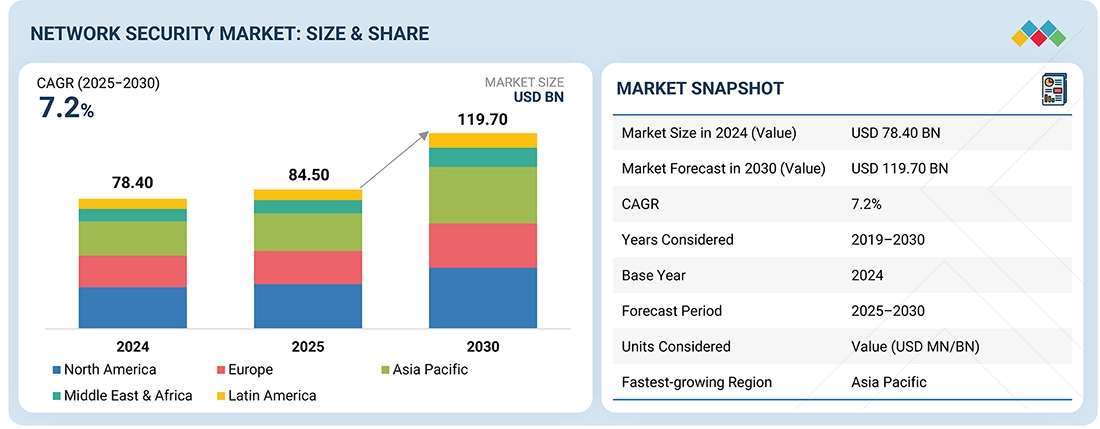
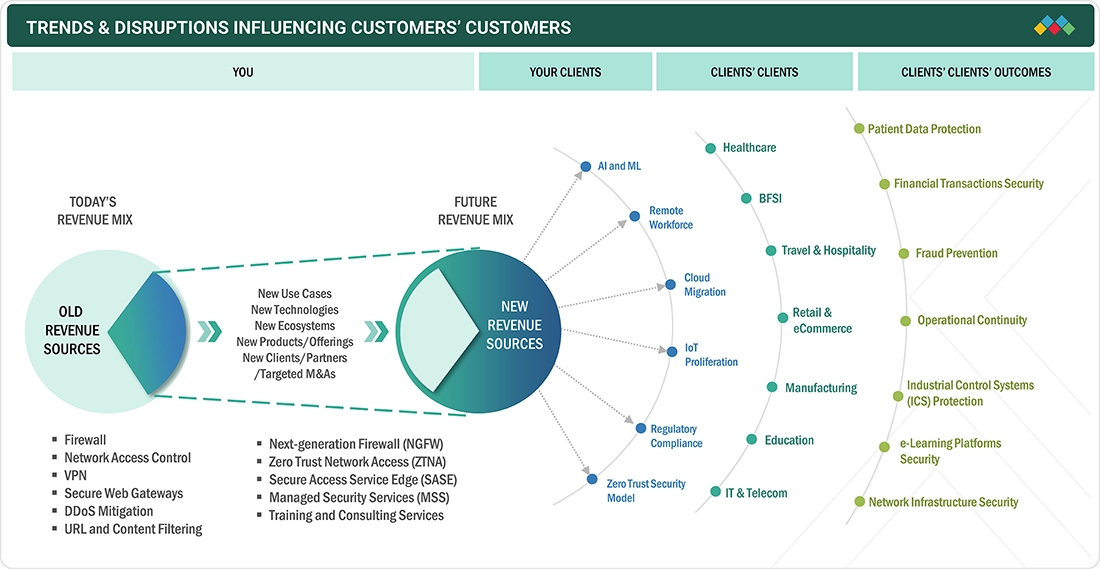




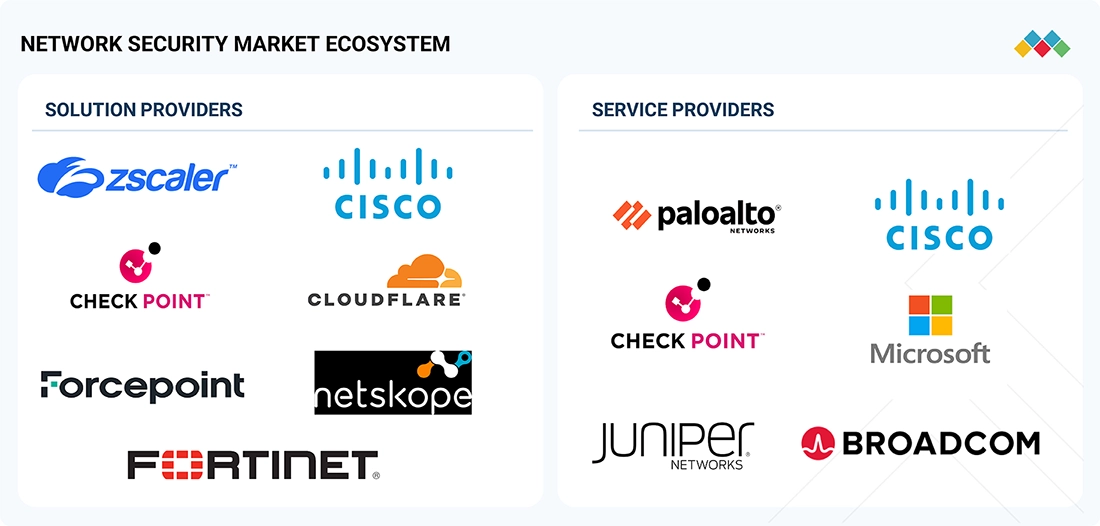
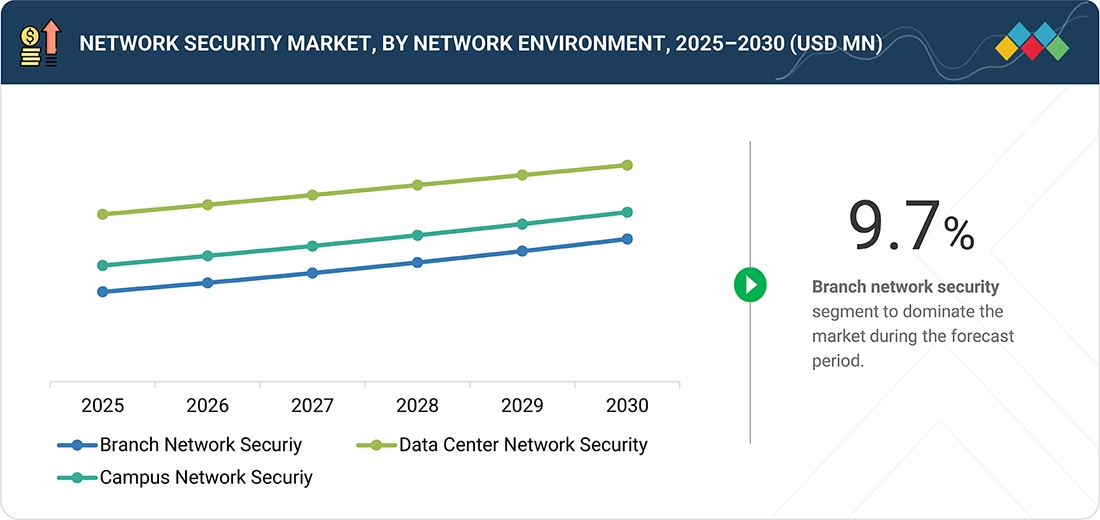
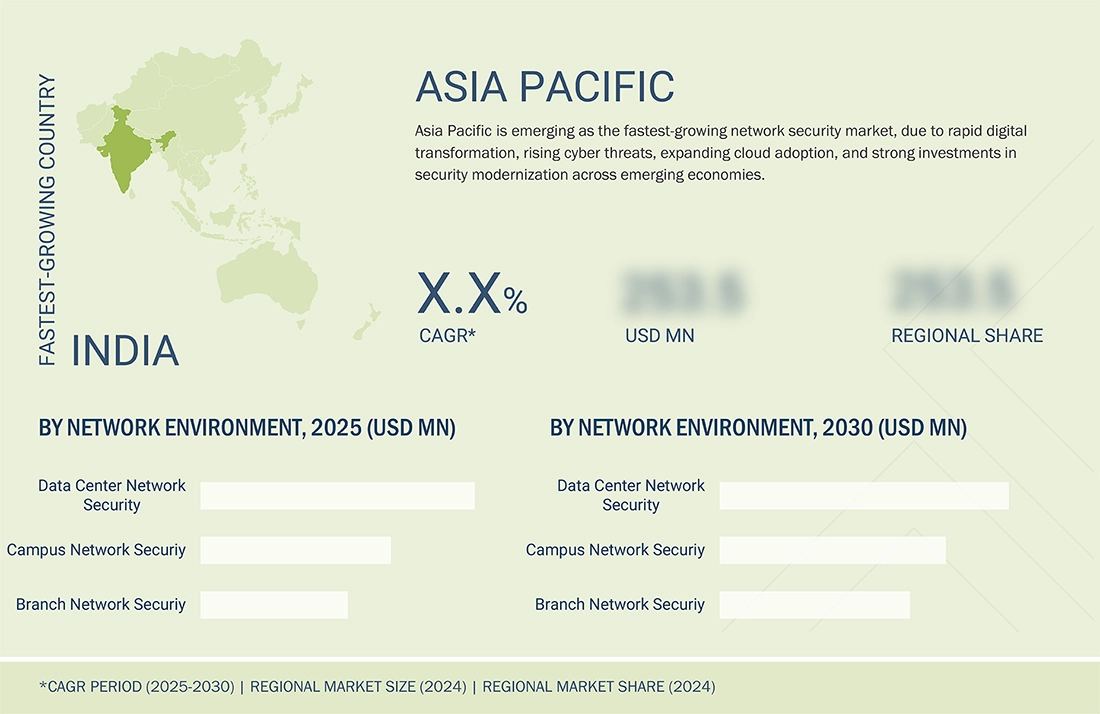
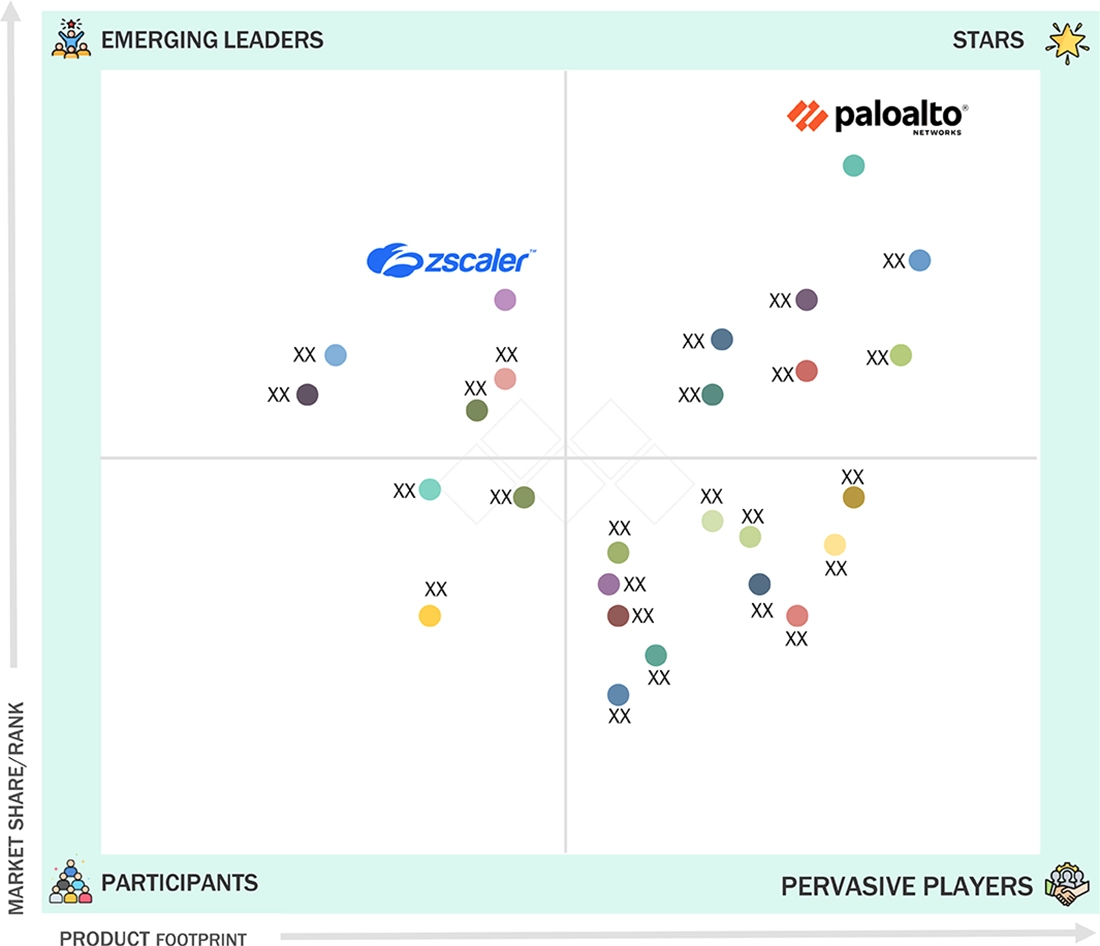
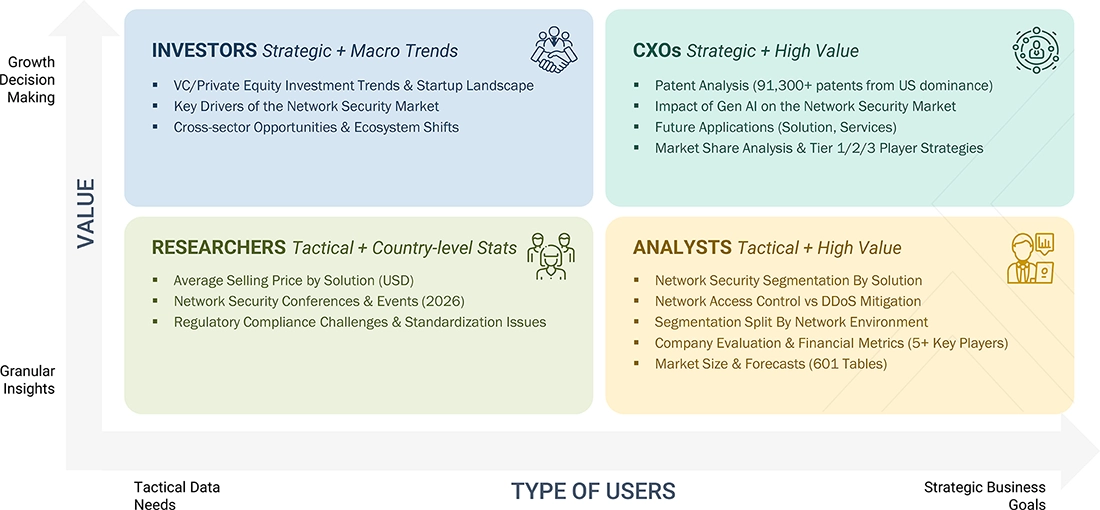

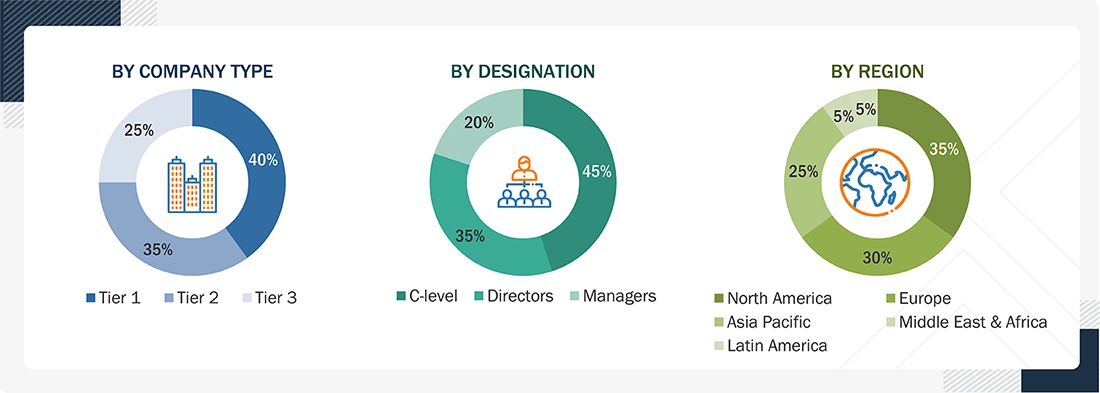
















Growth opportunities and latent adjacency in Network Security Market